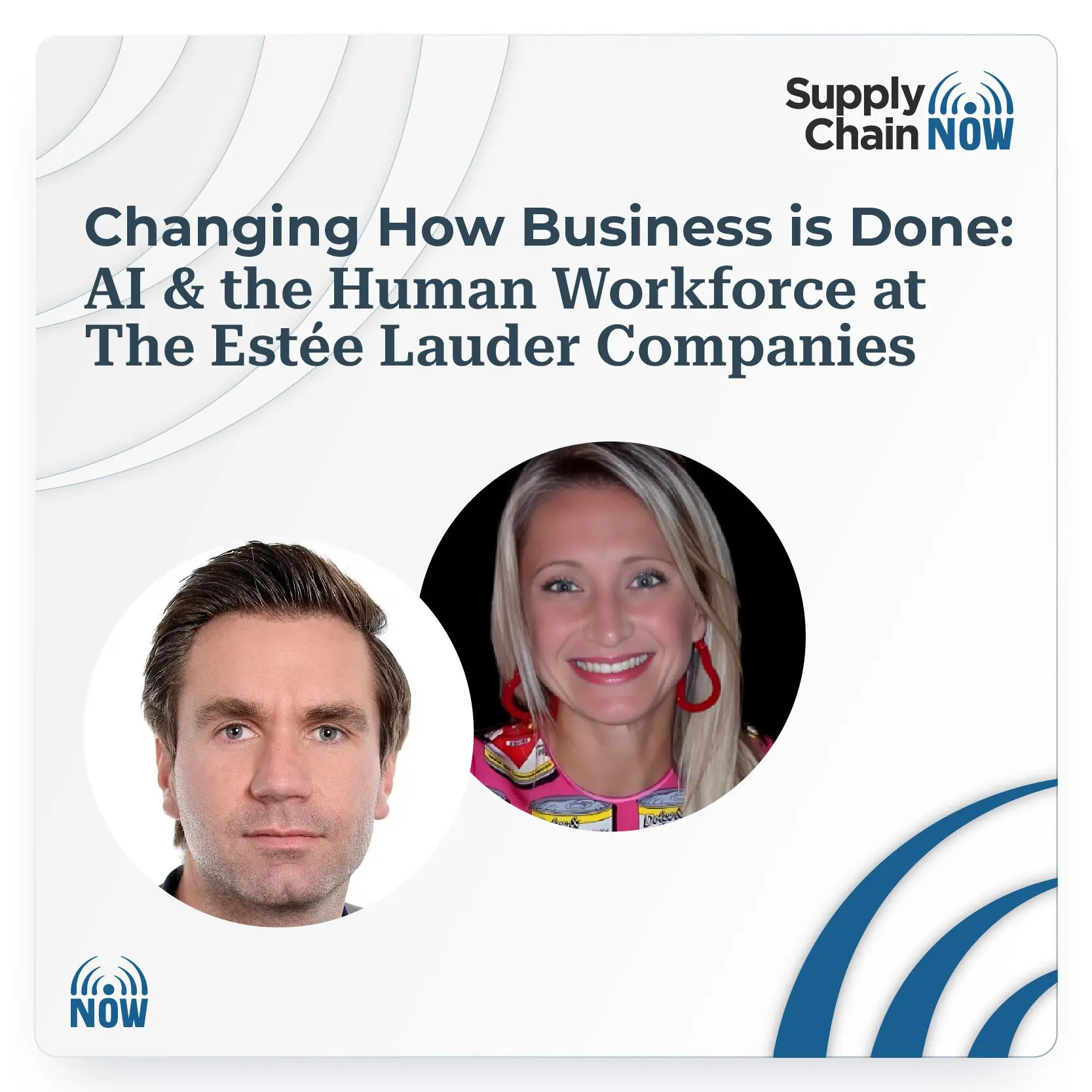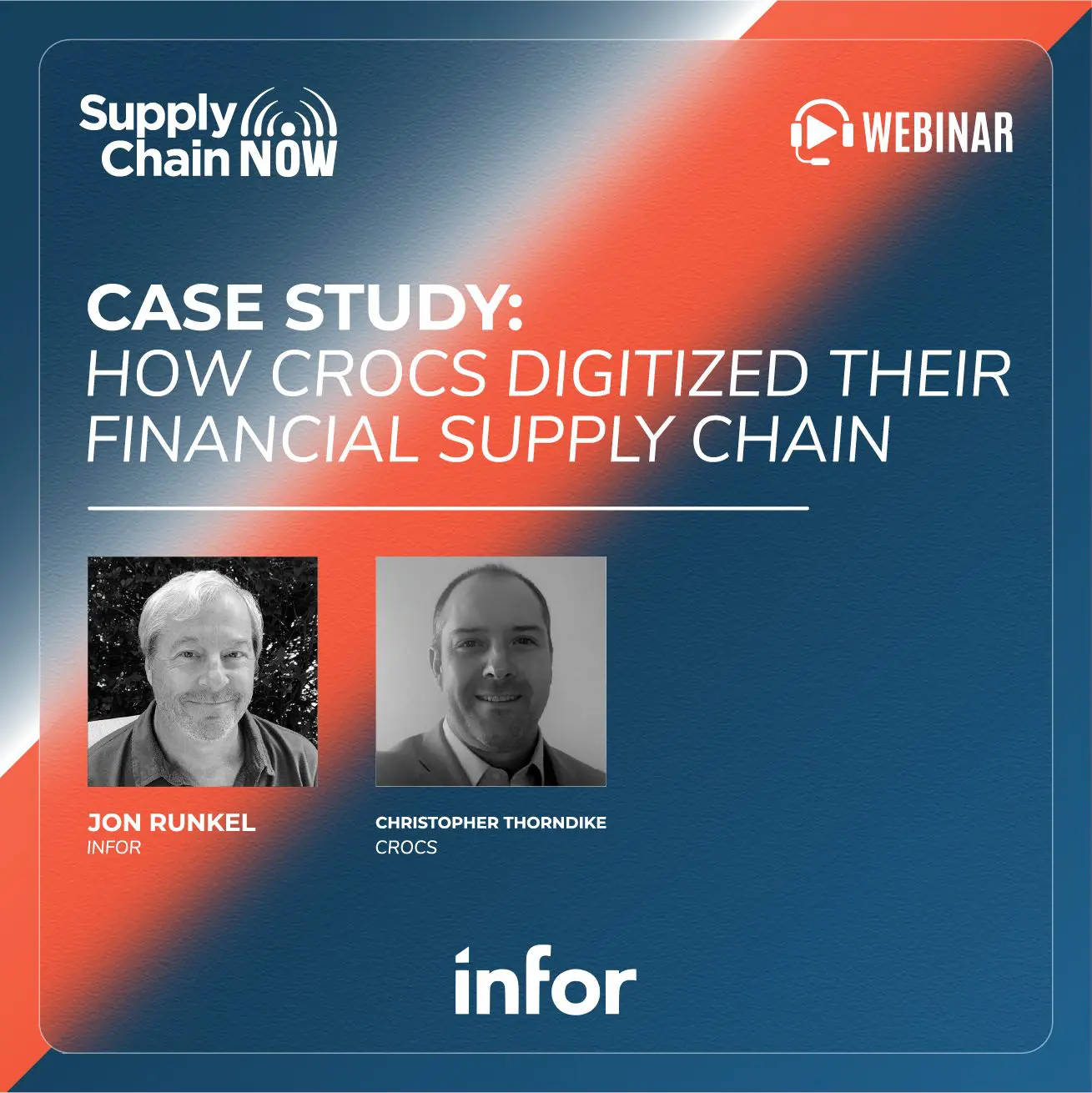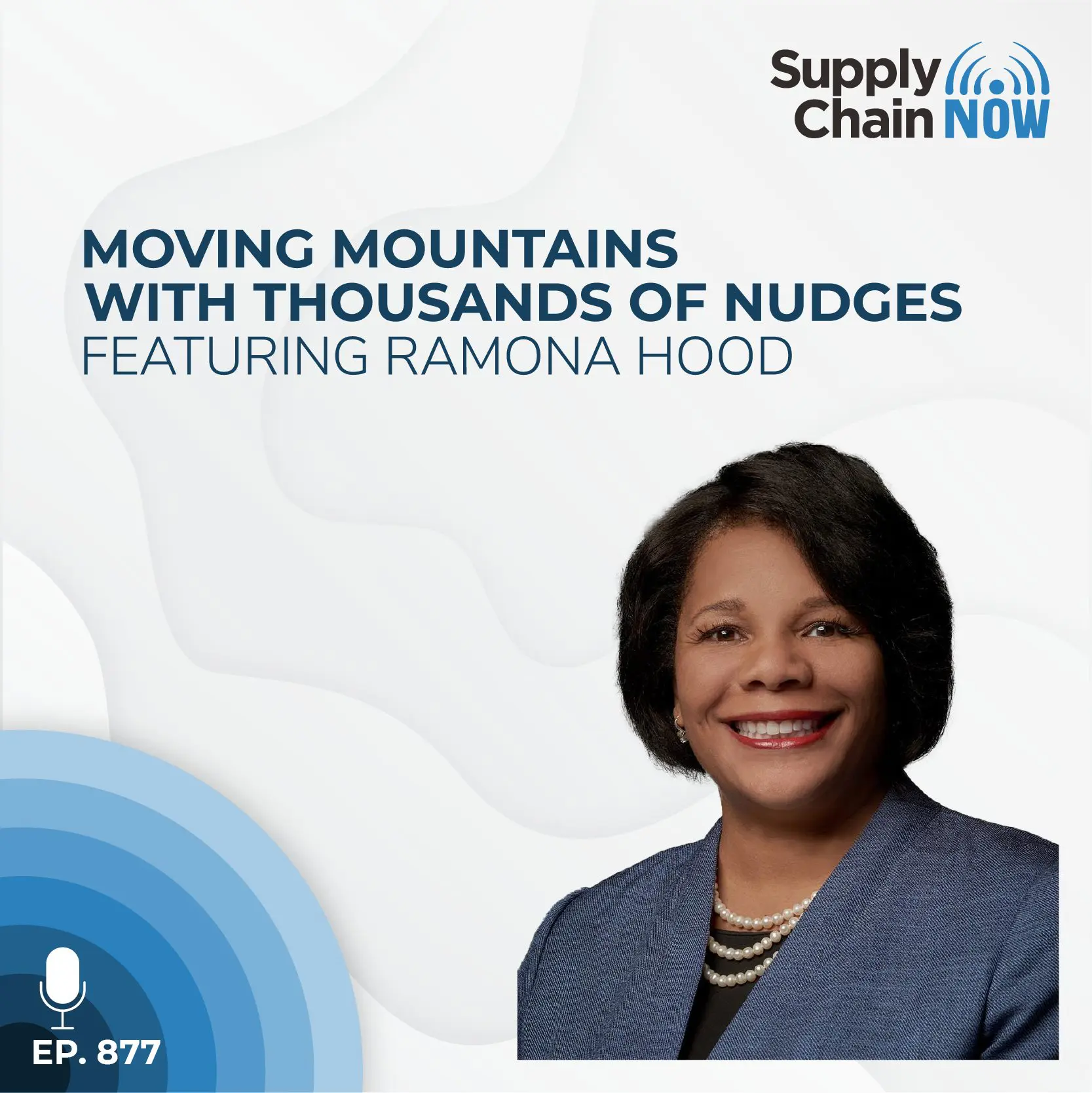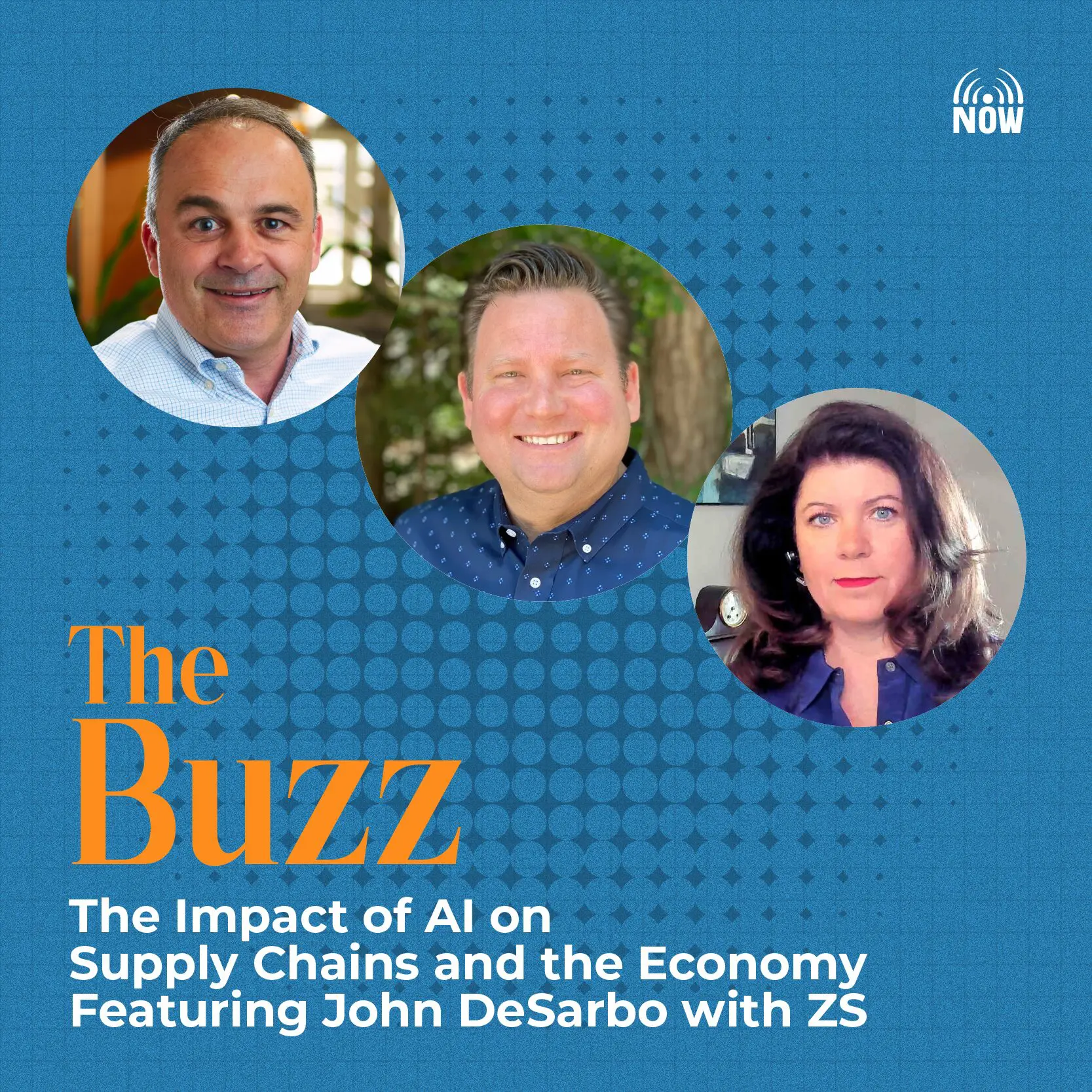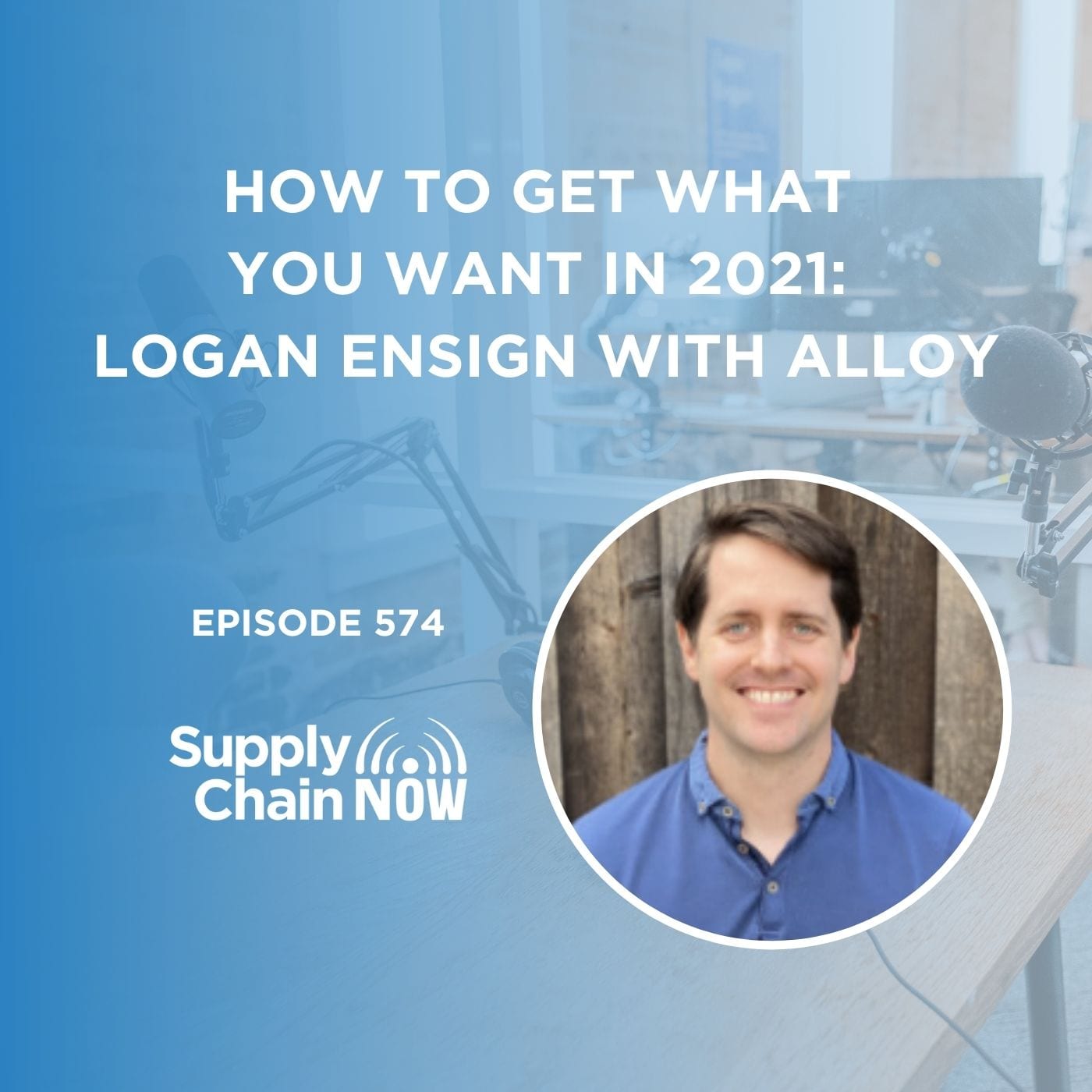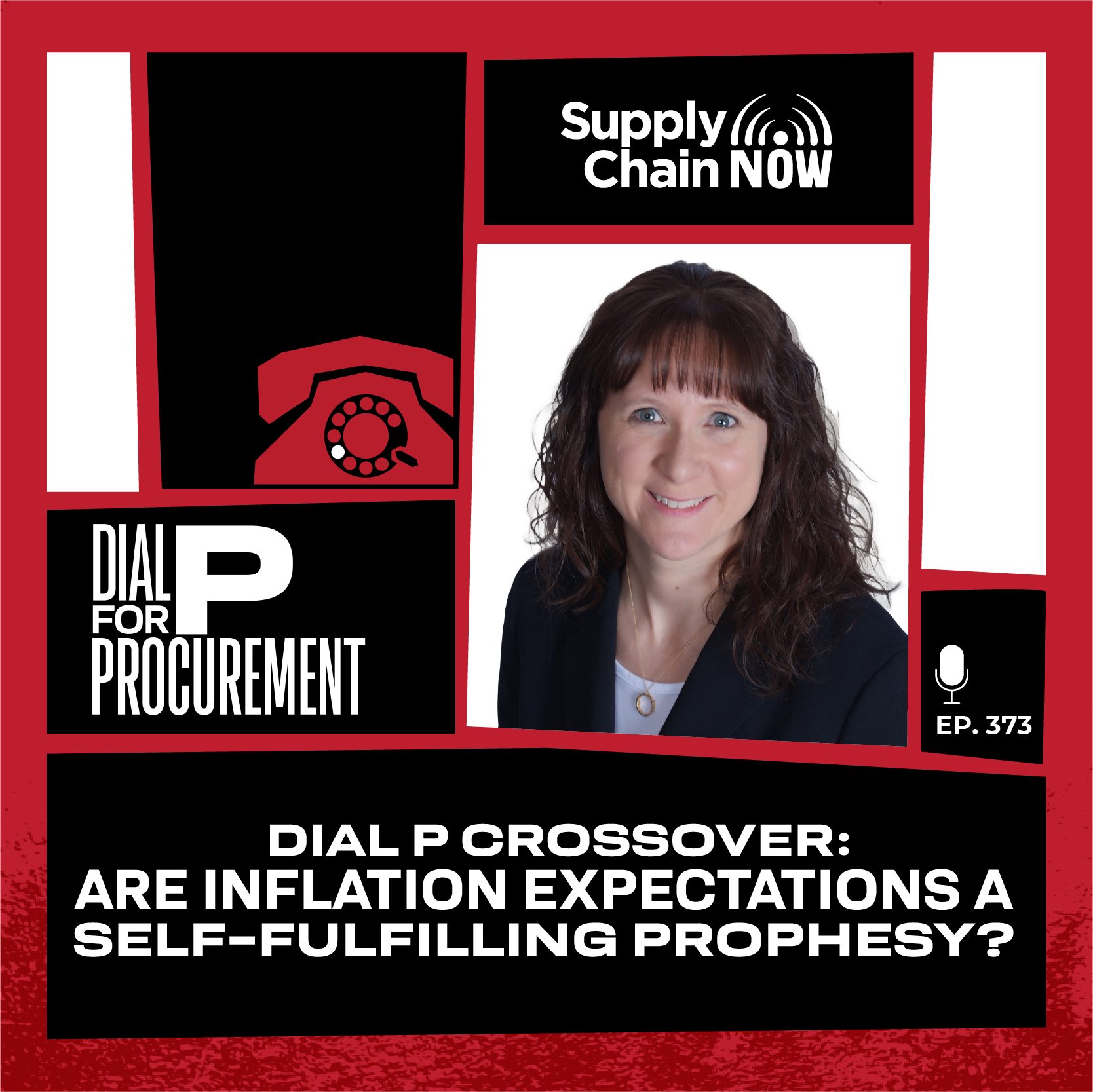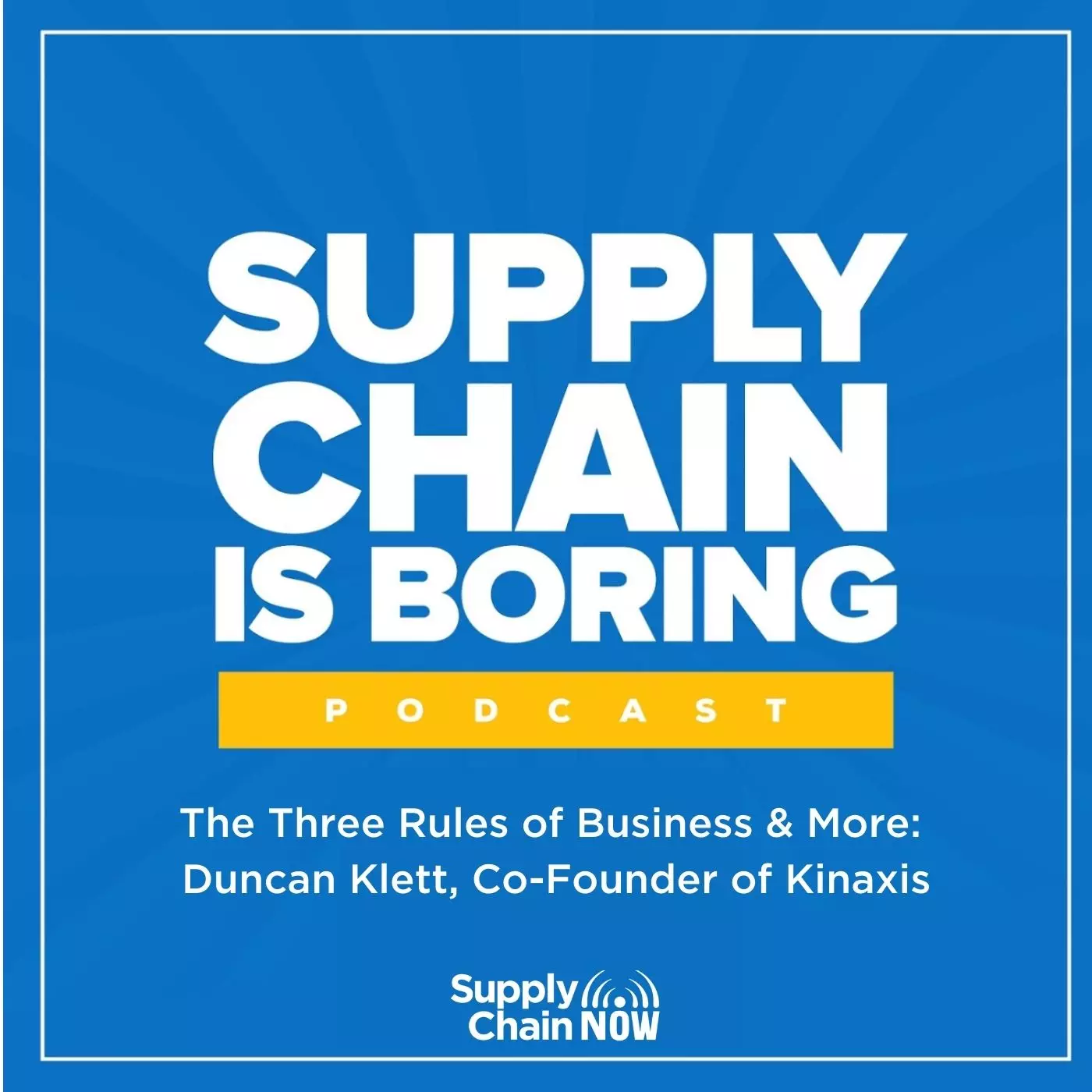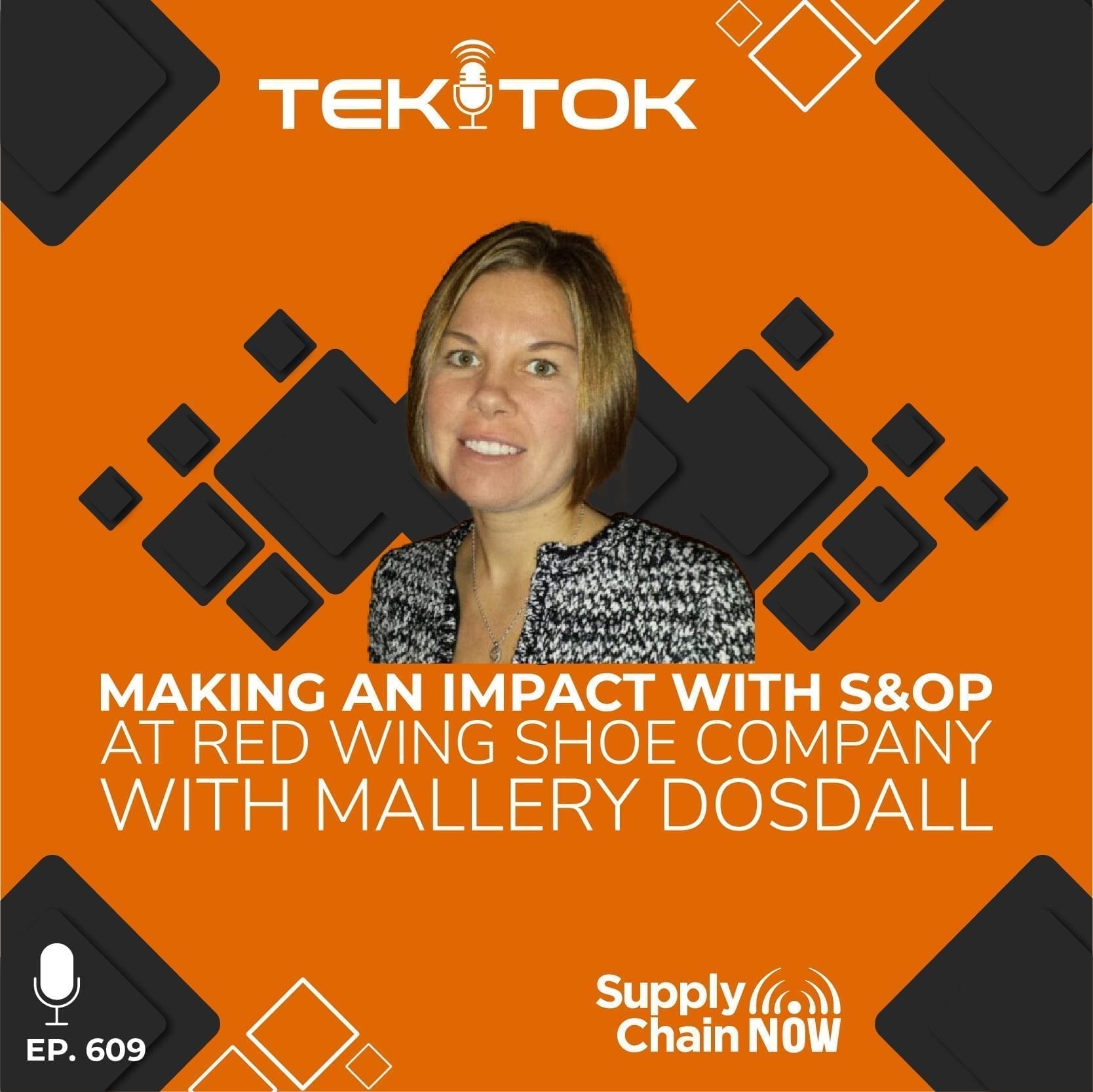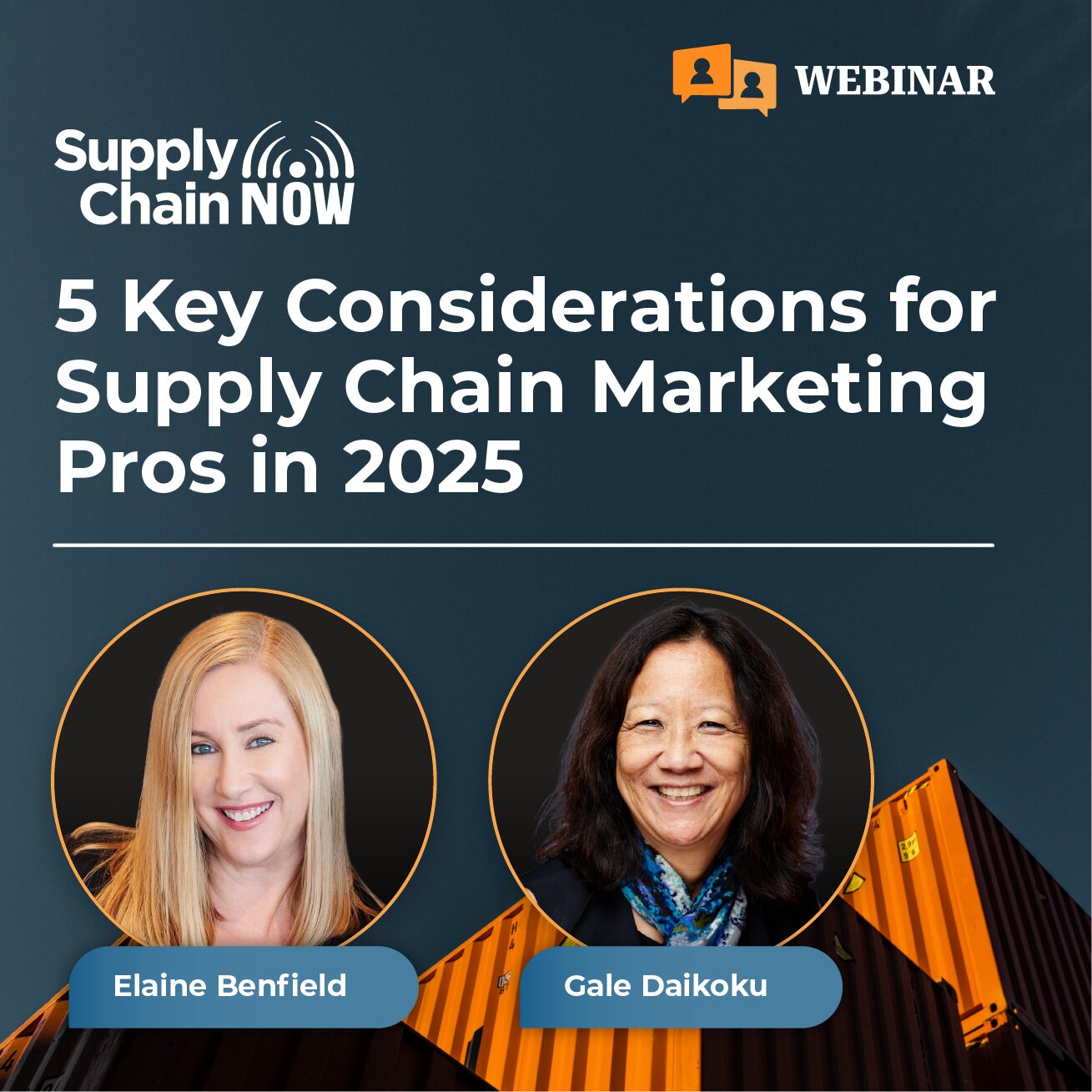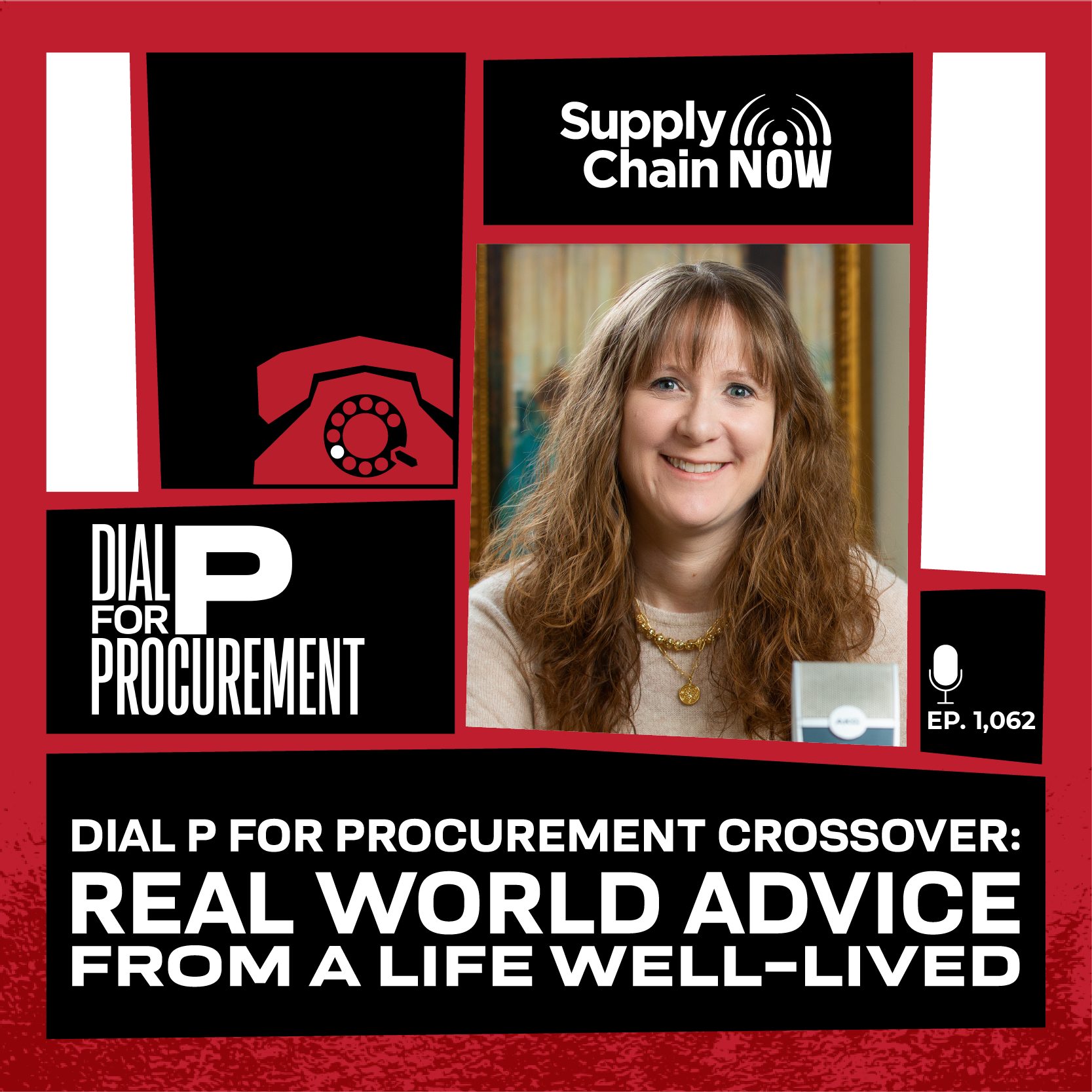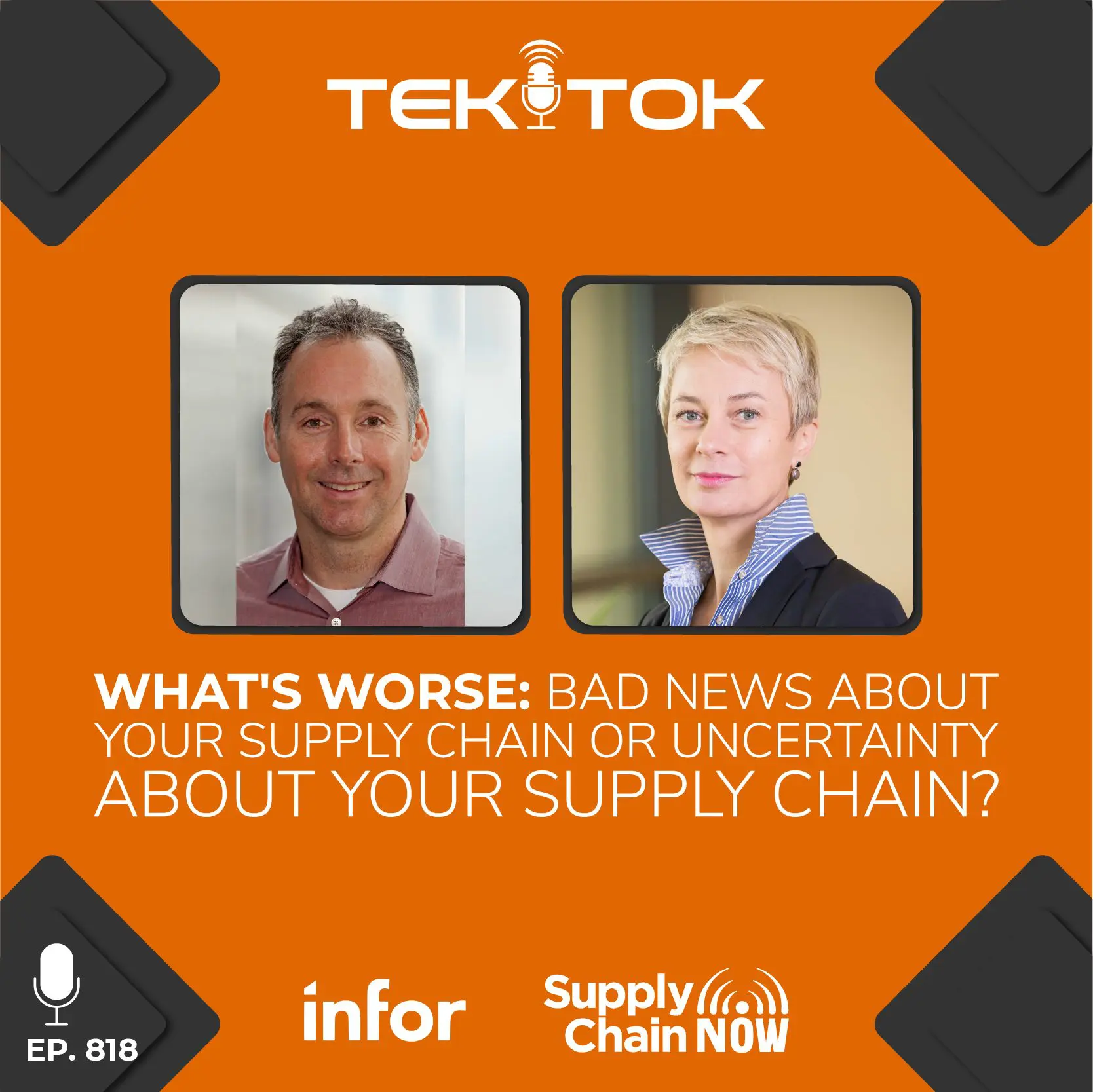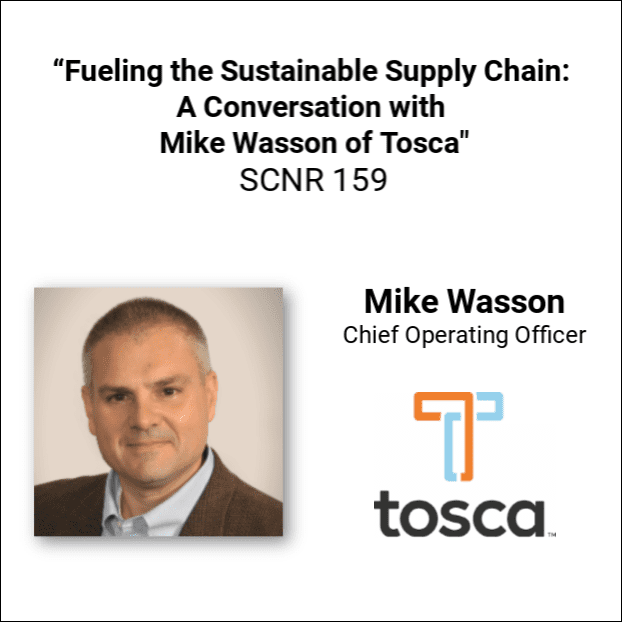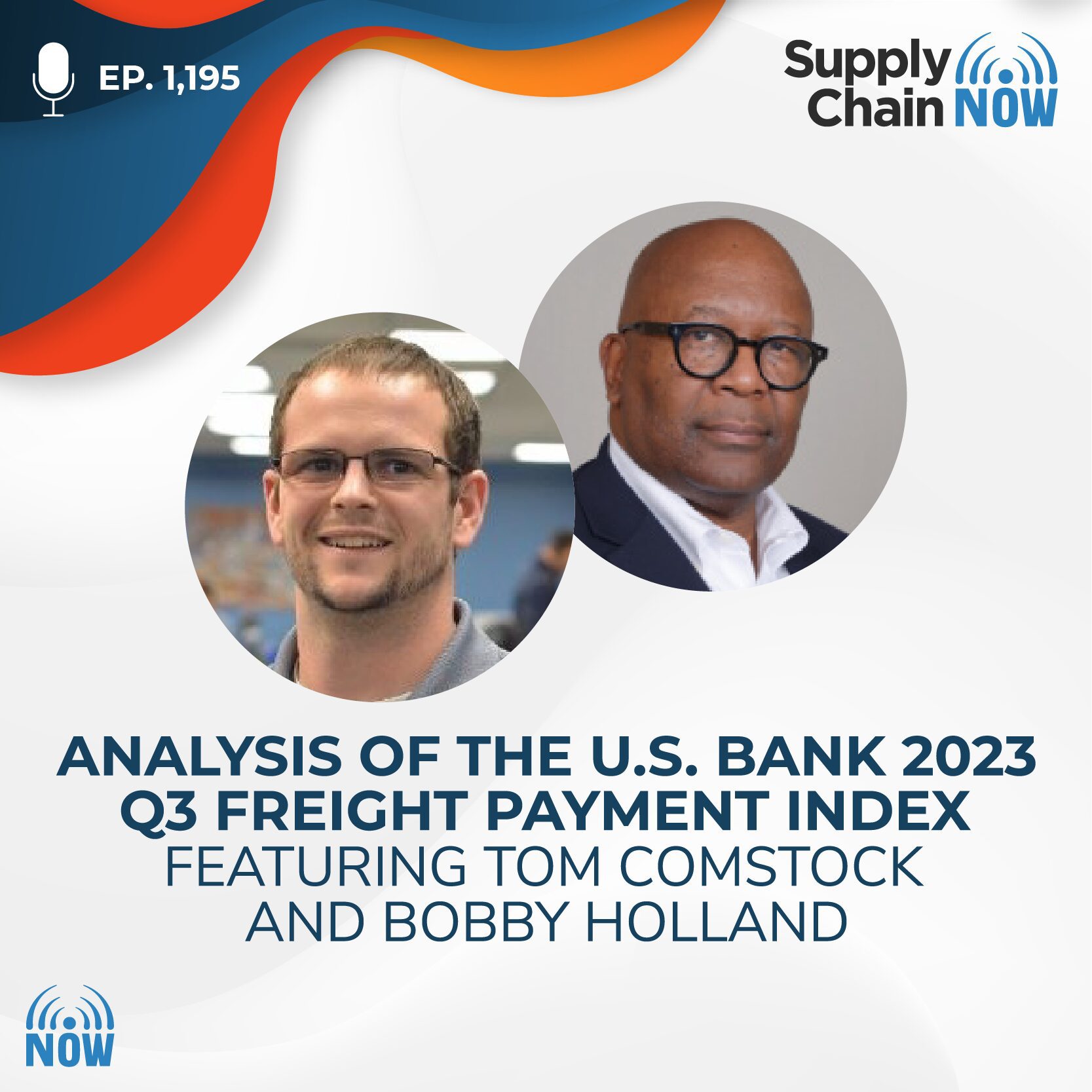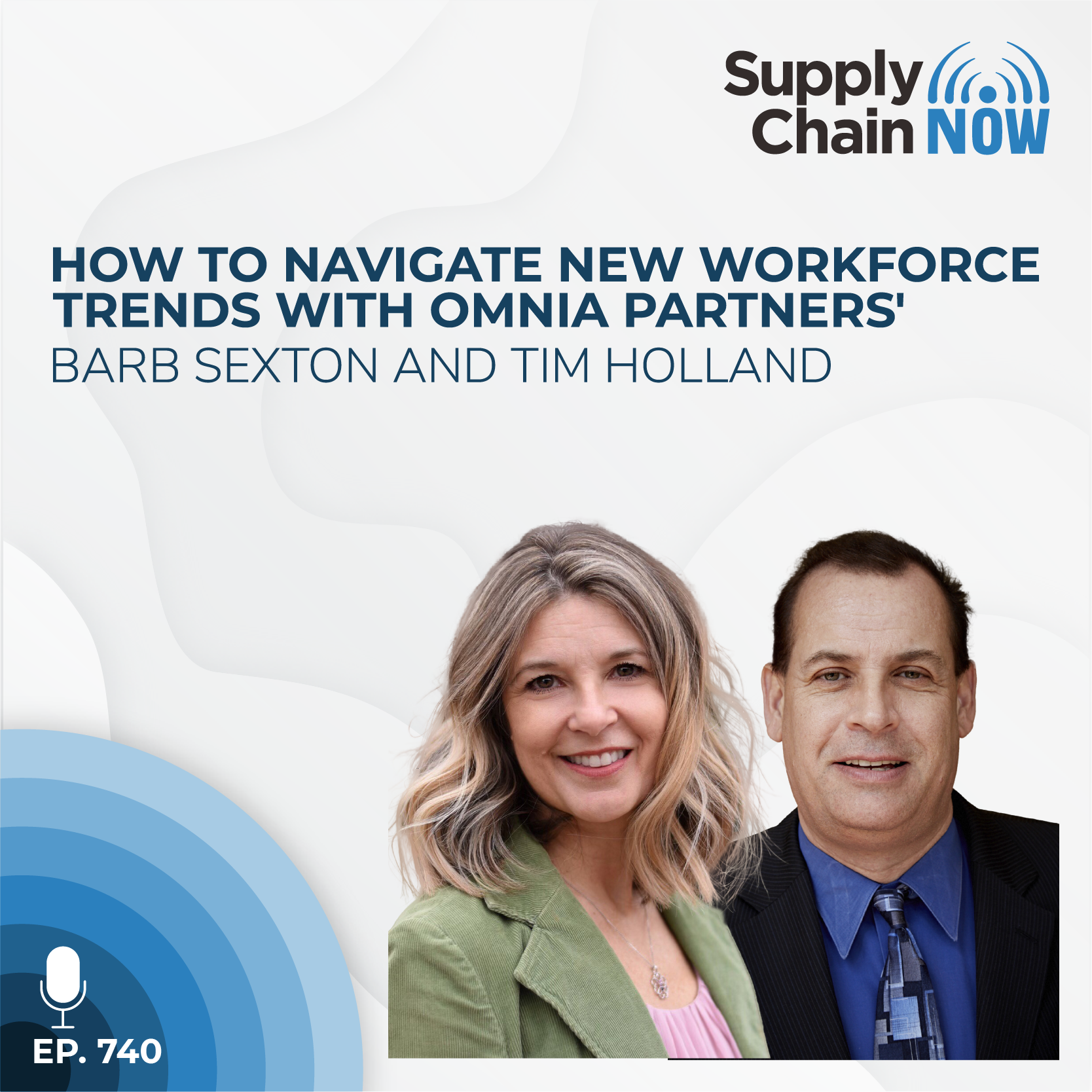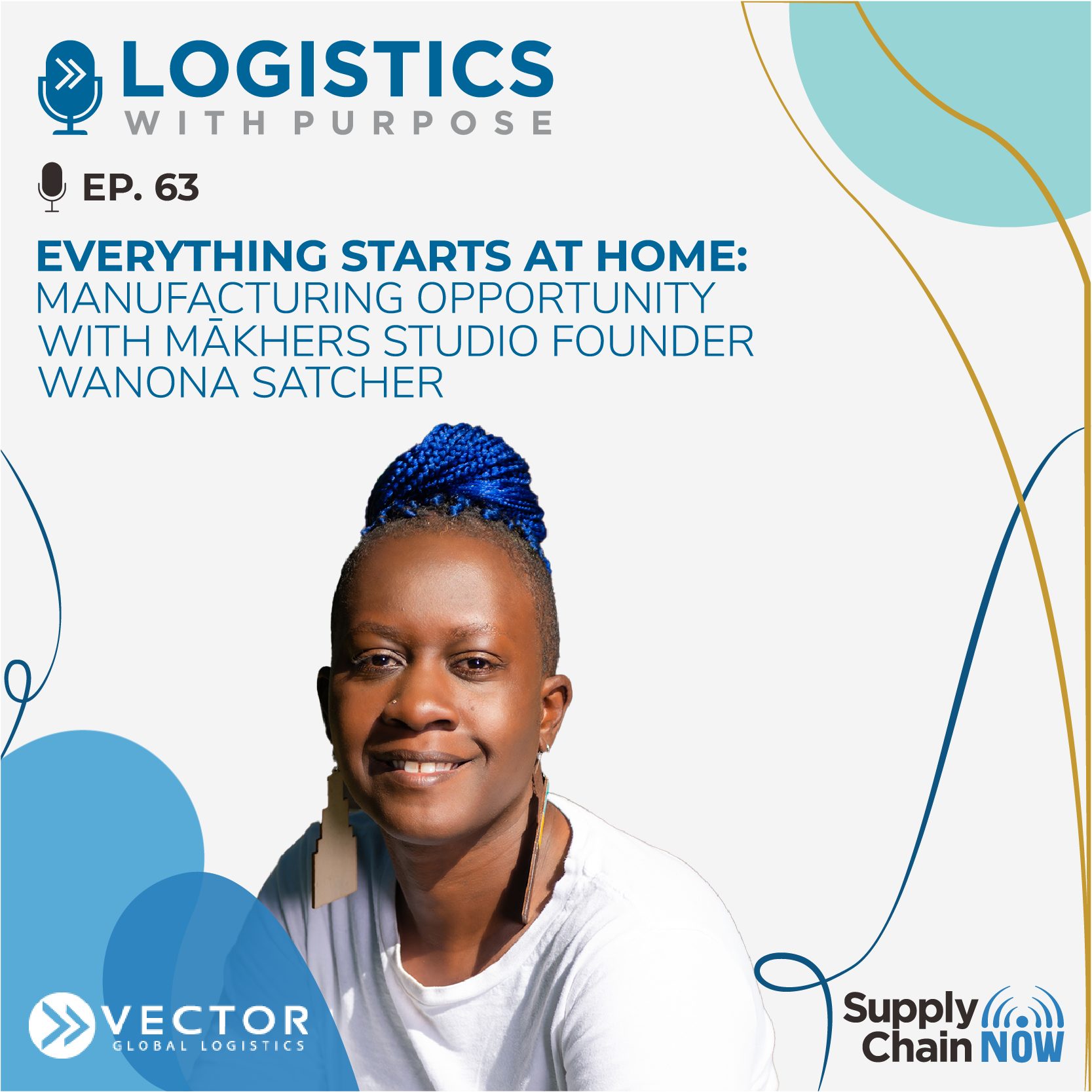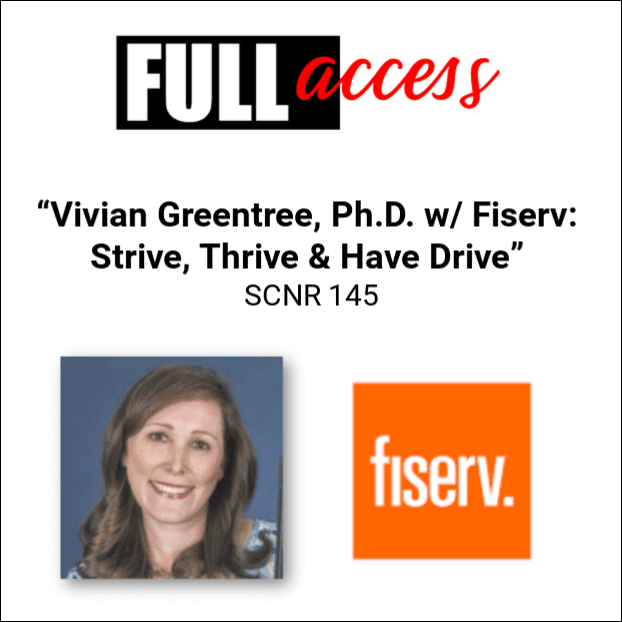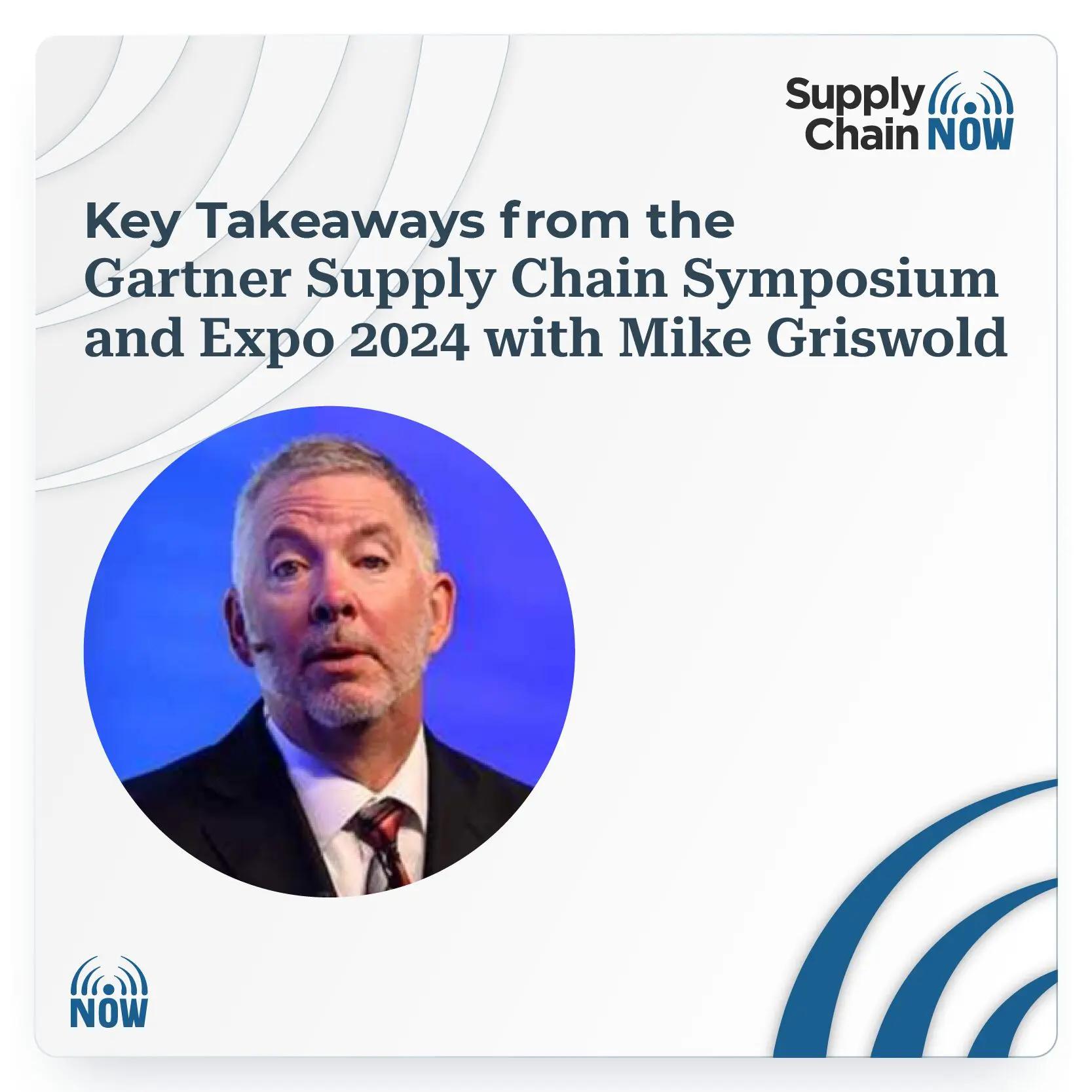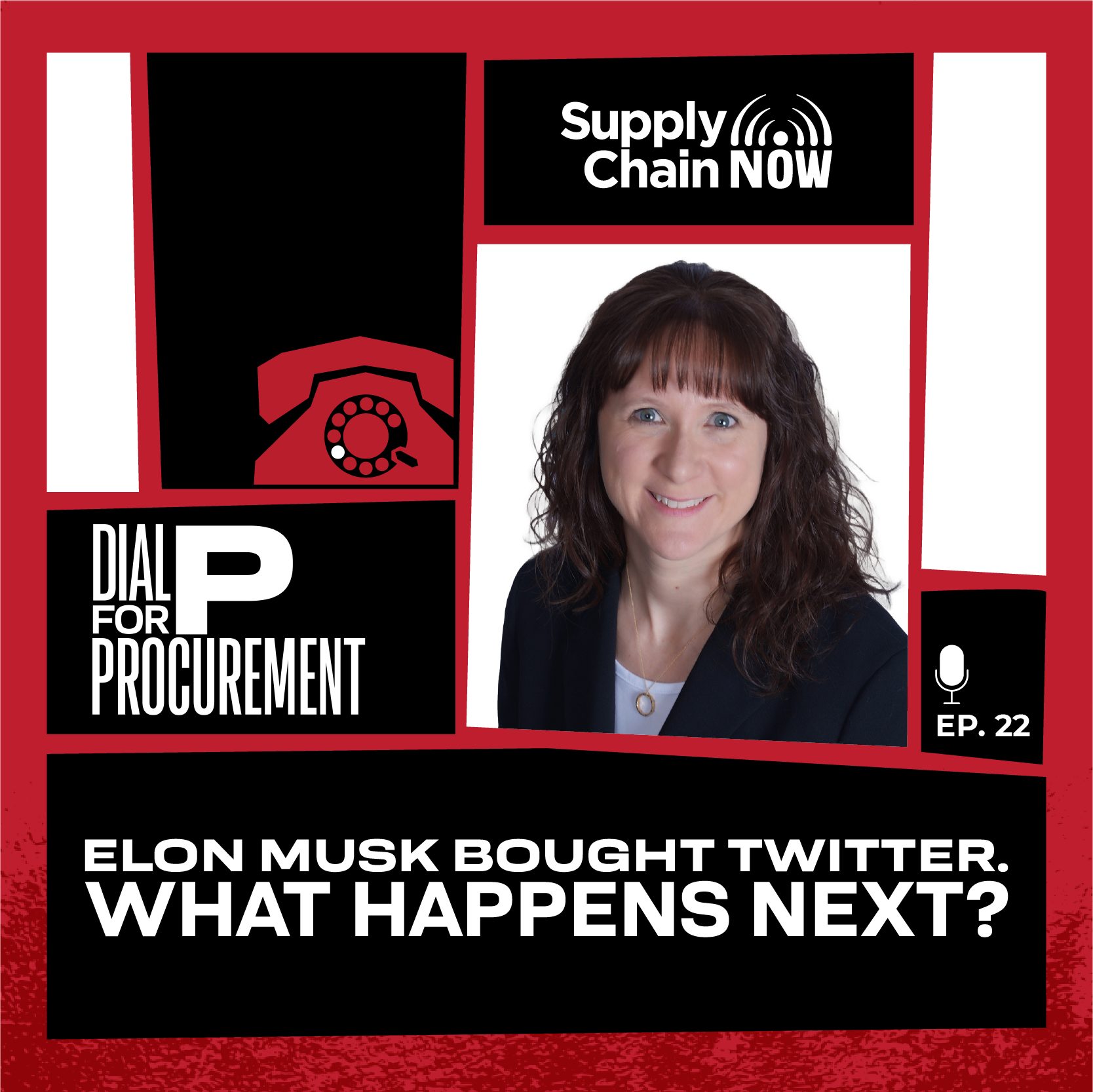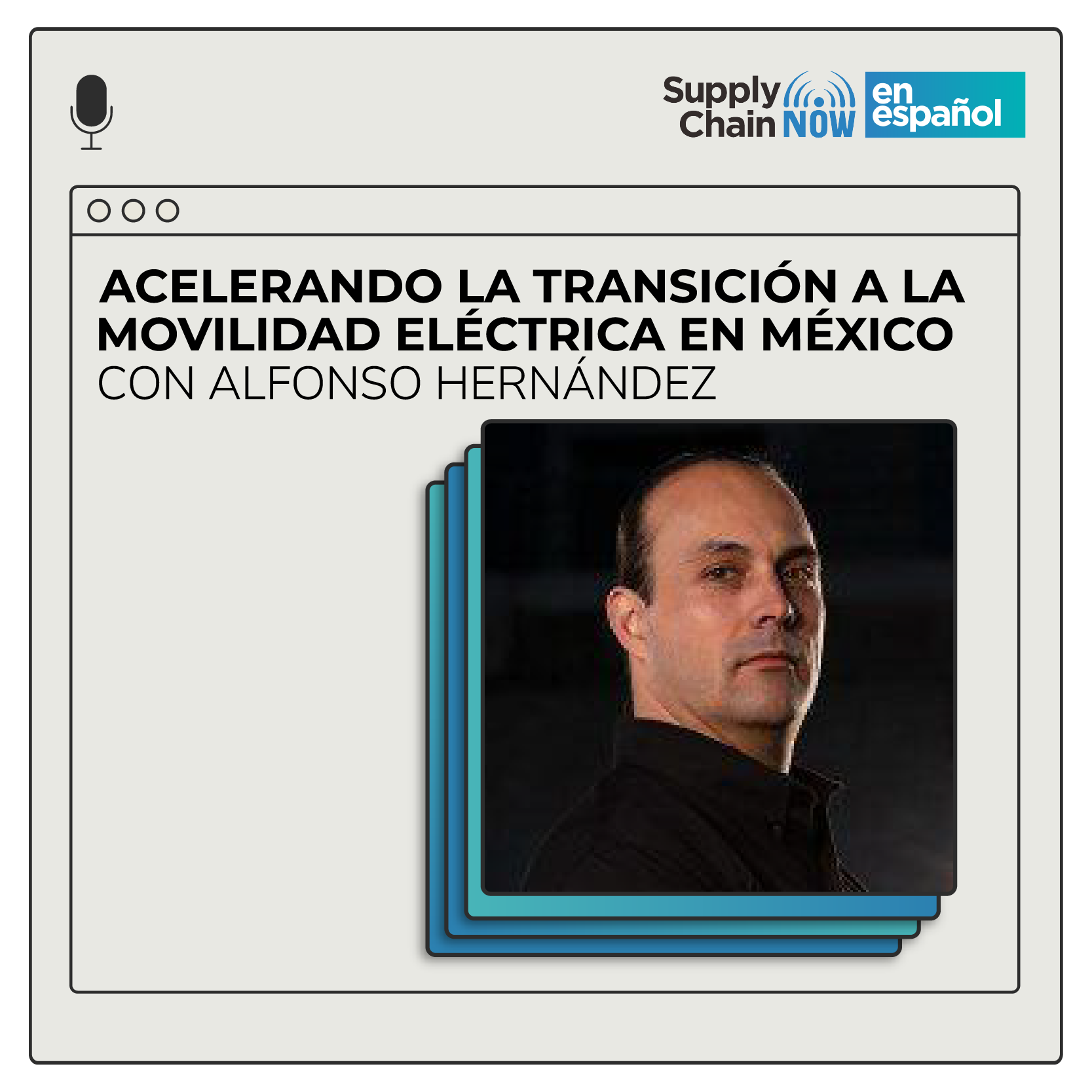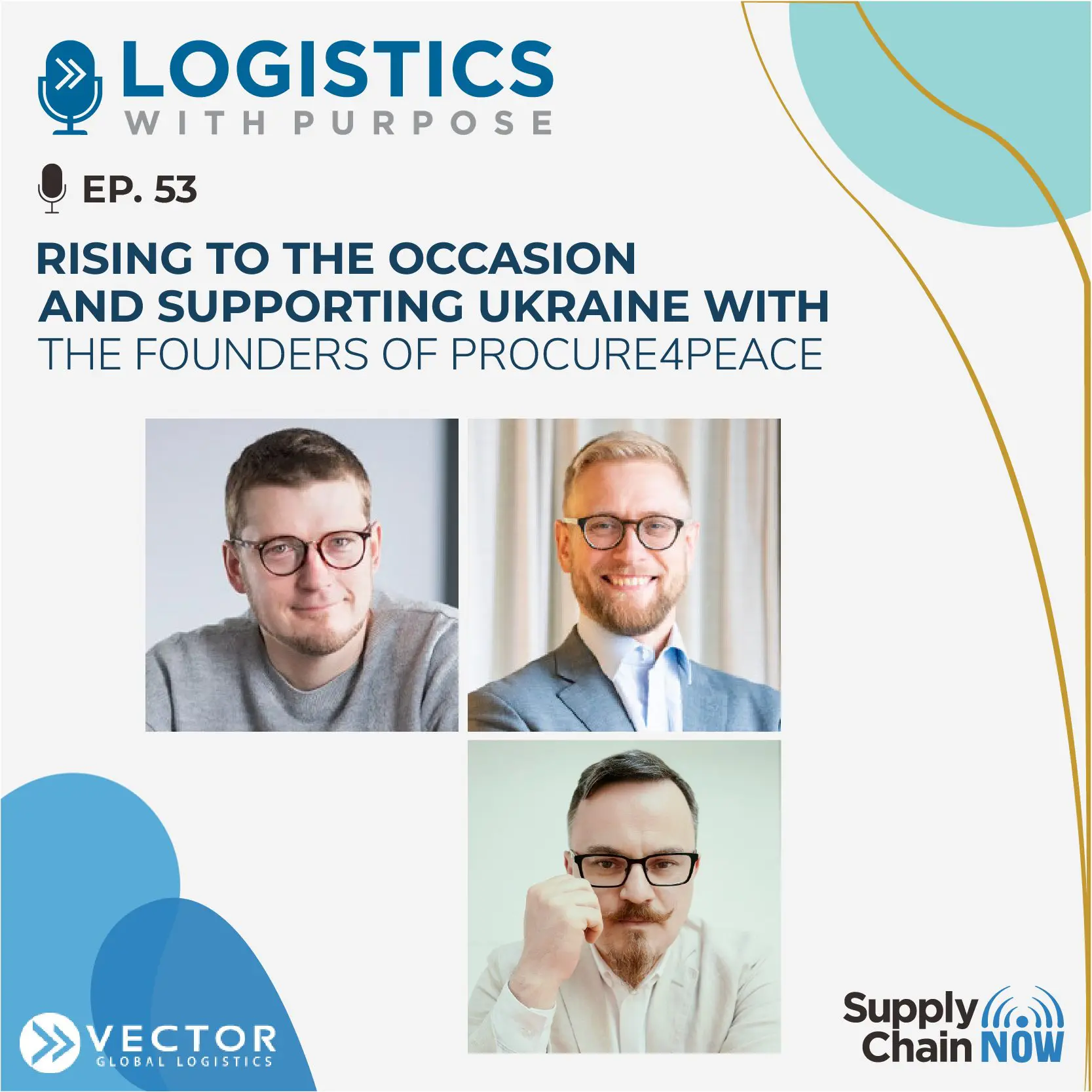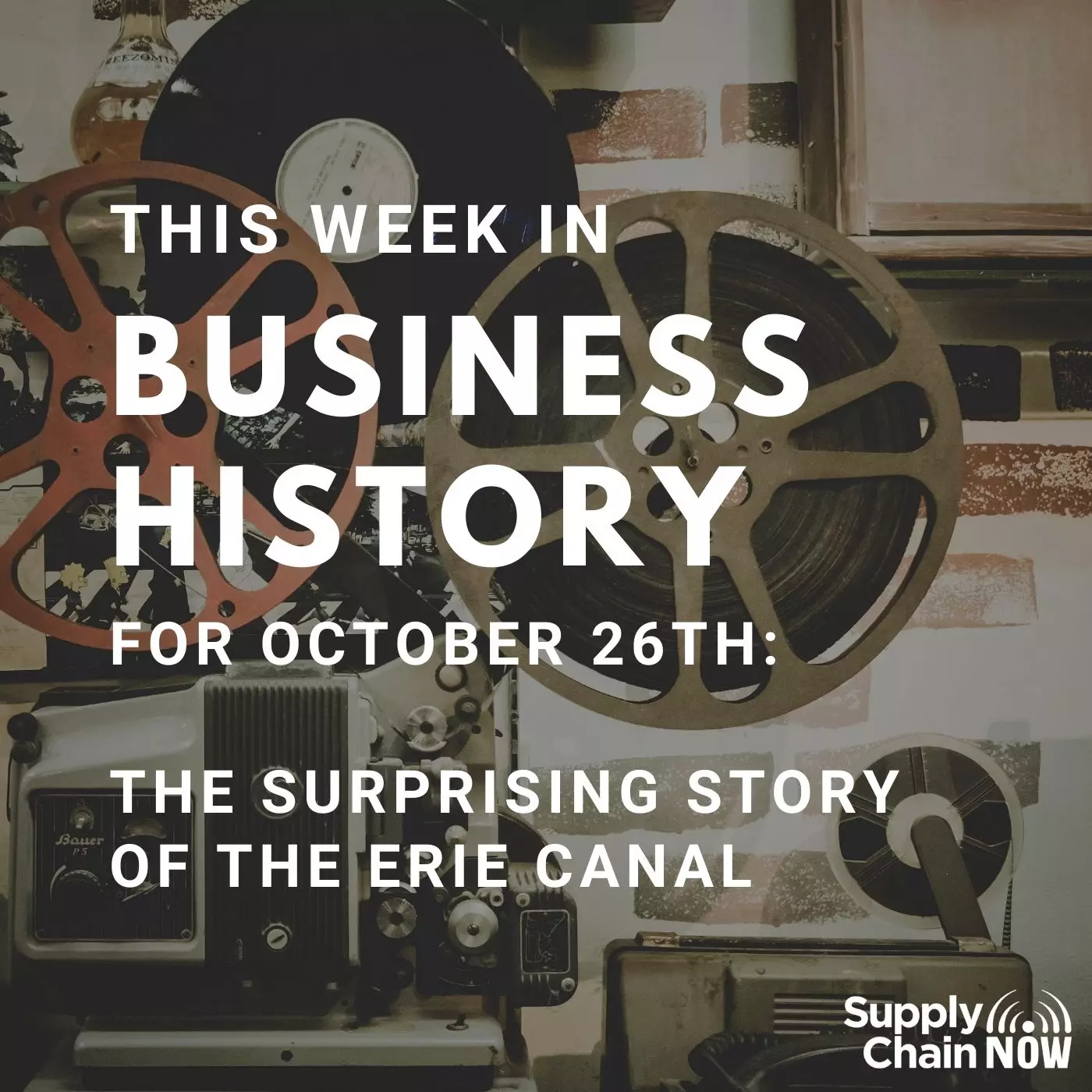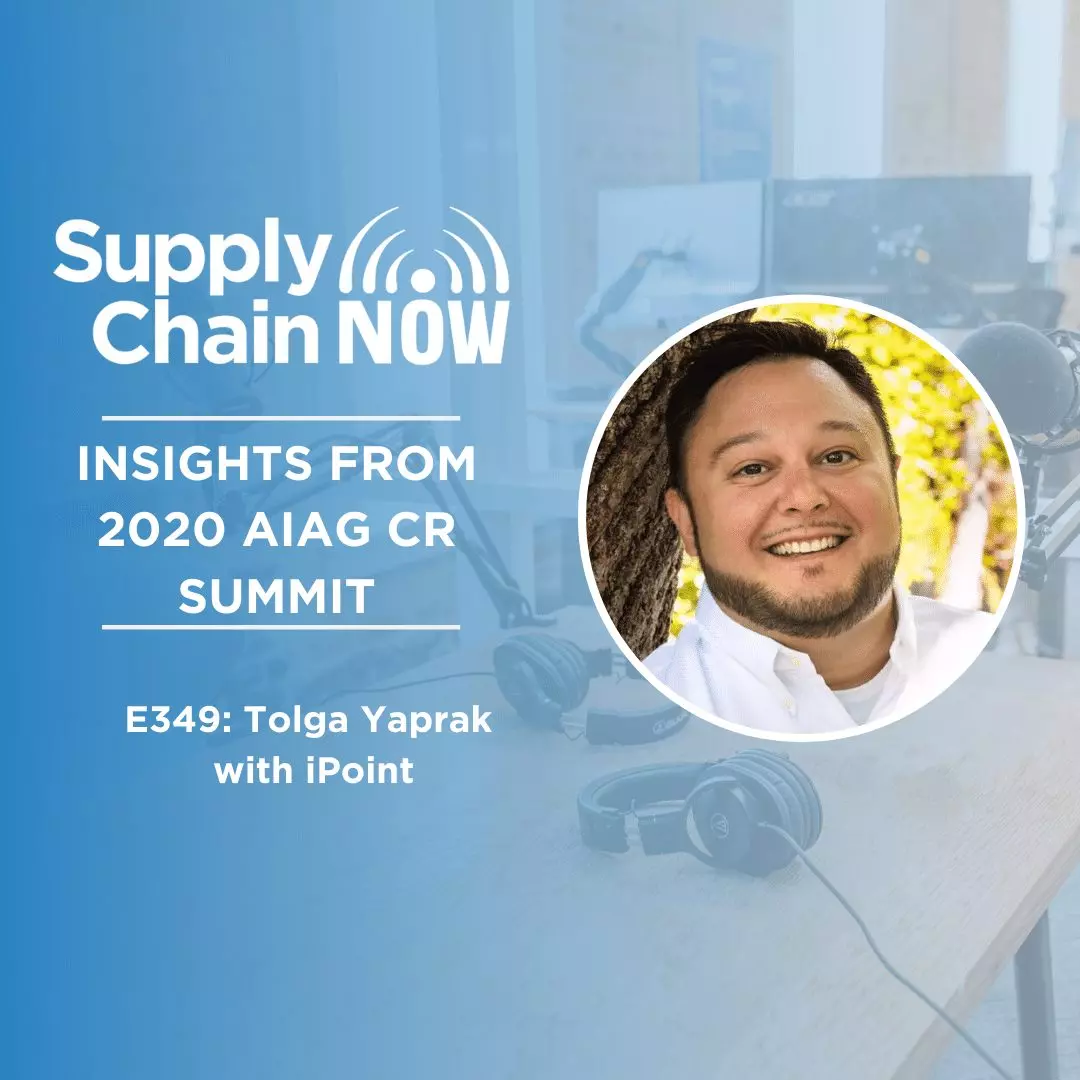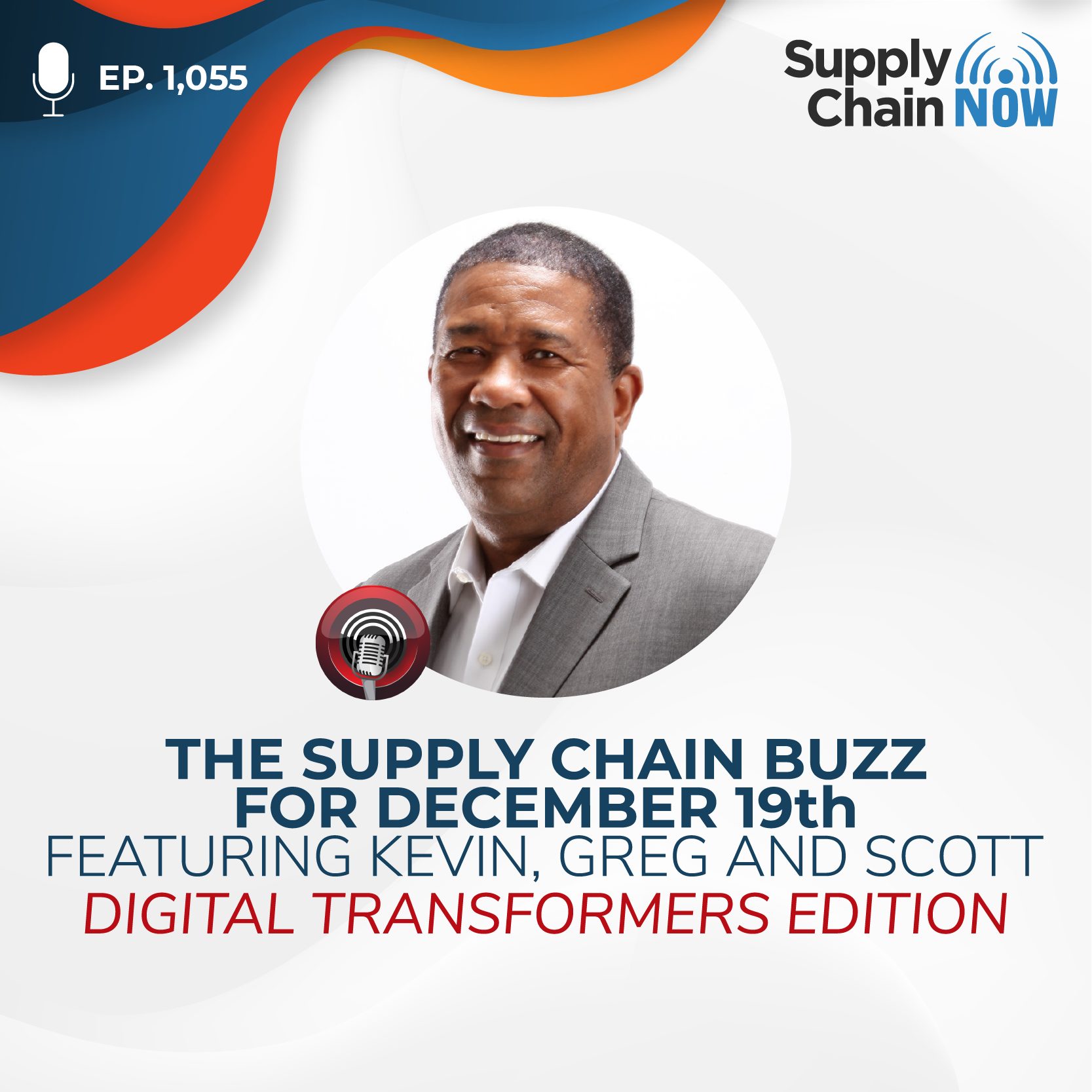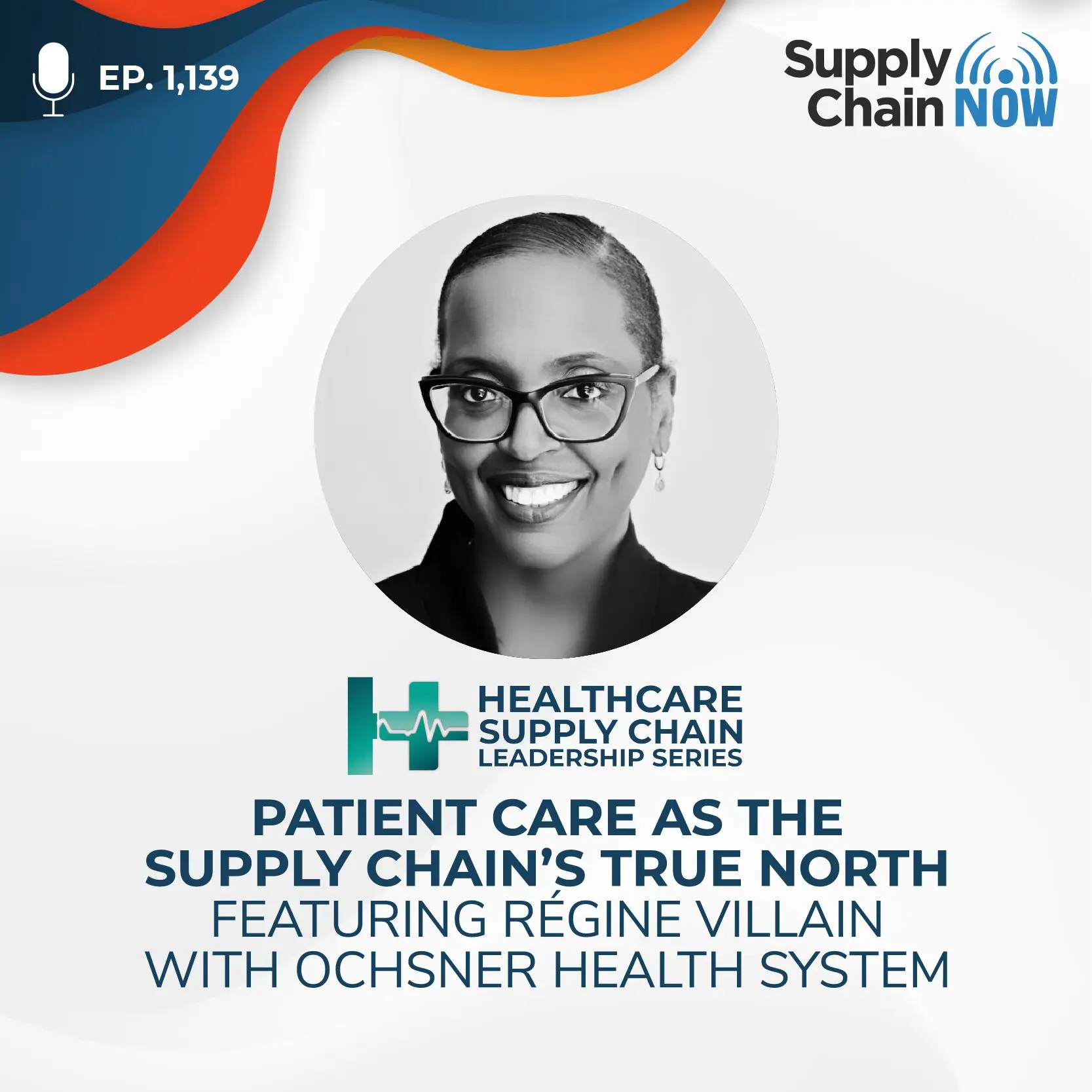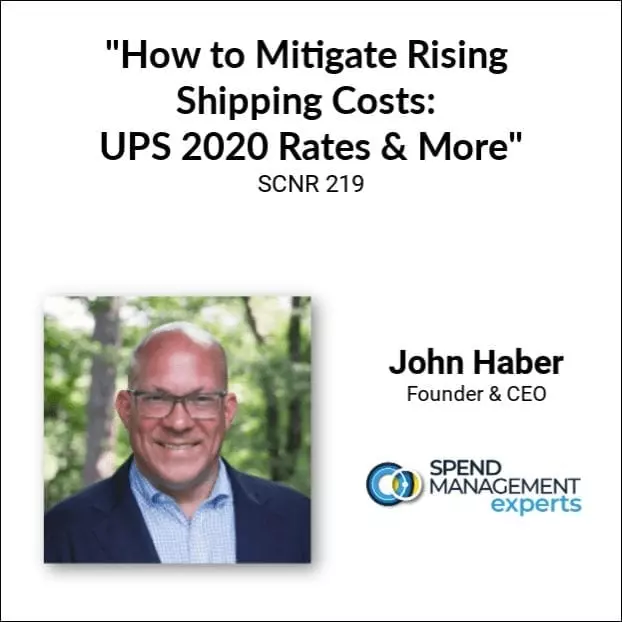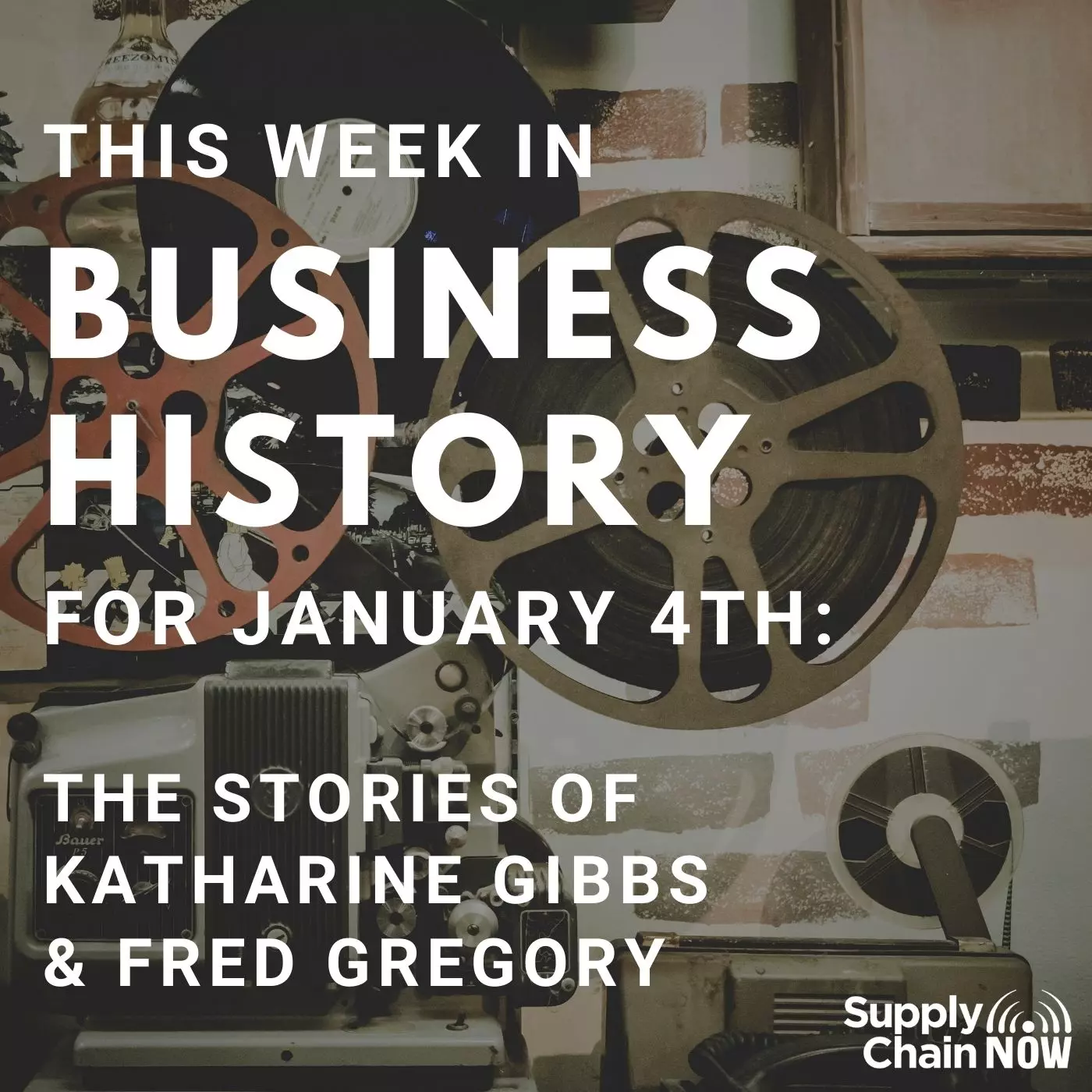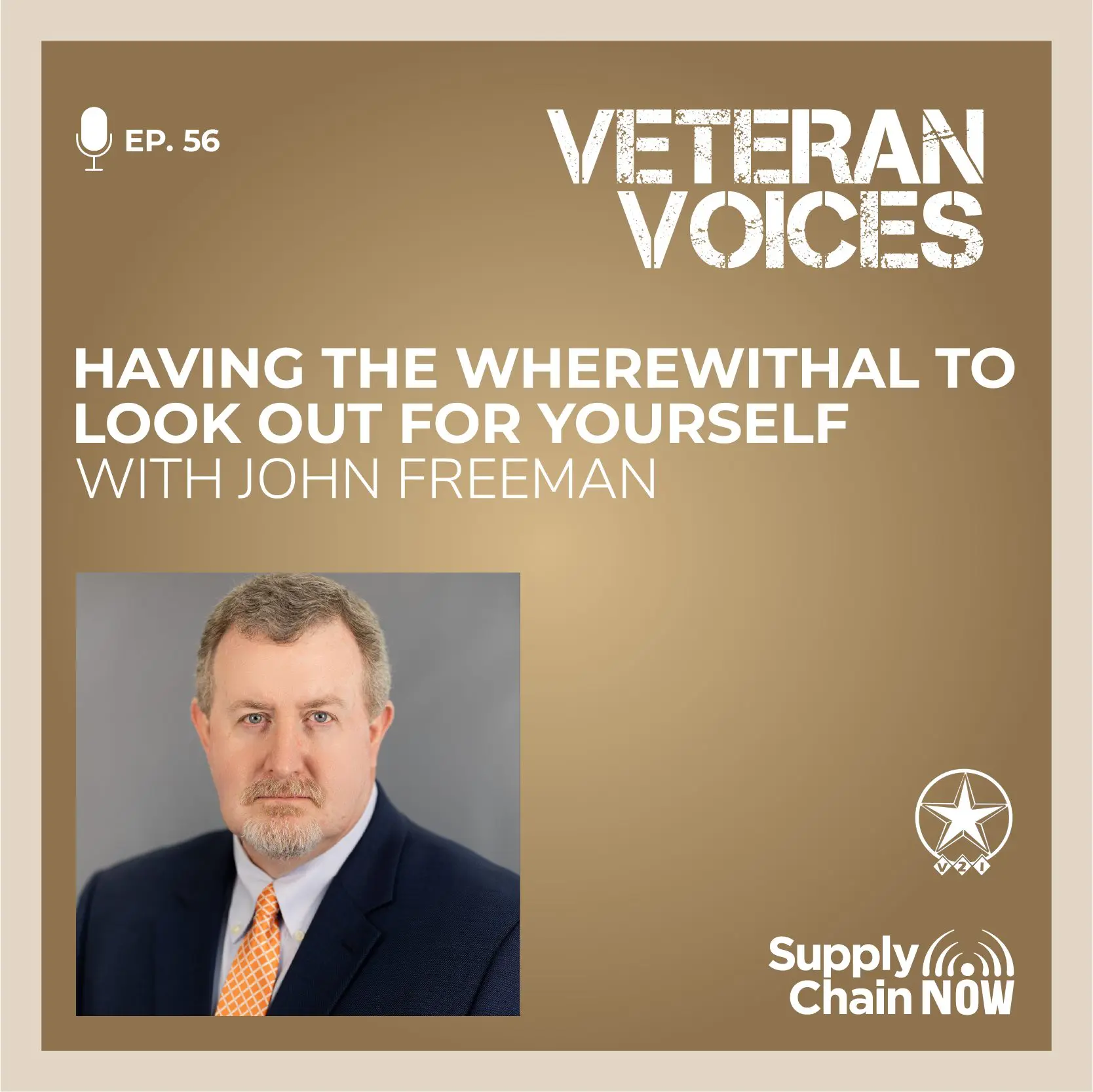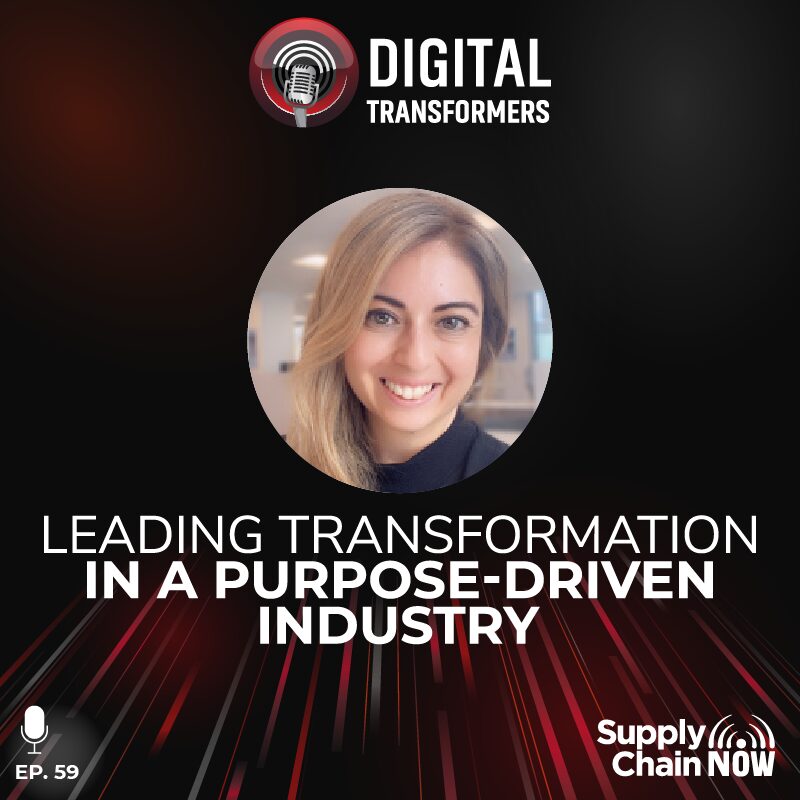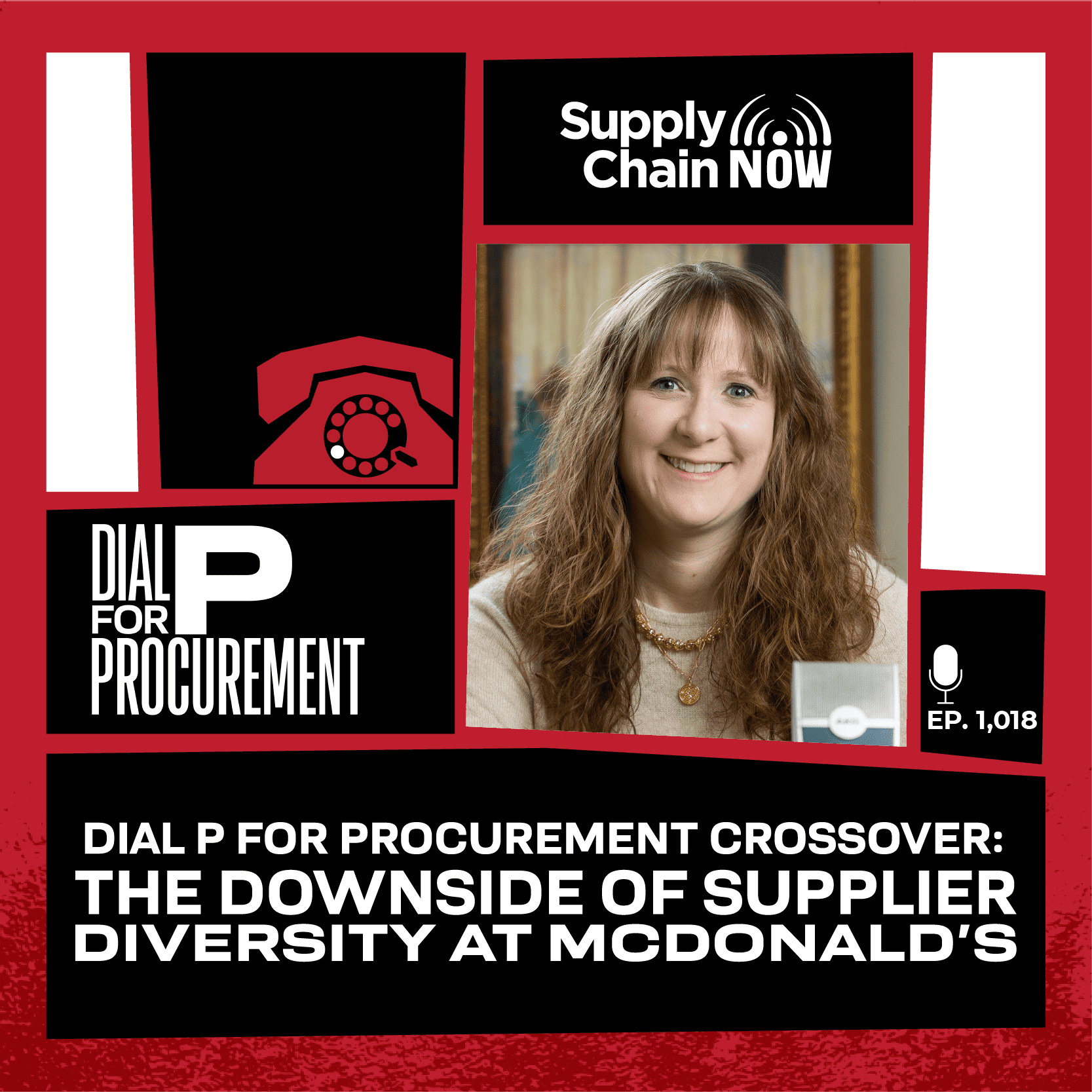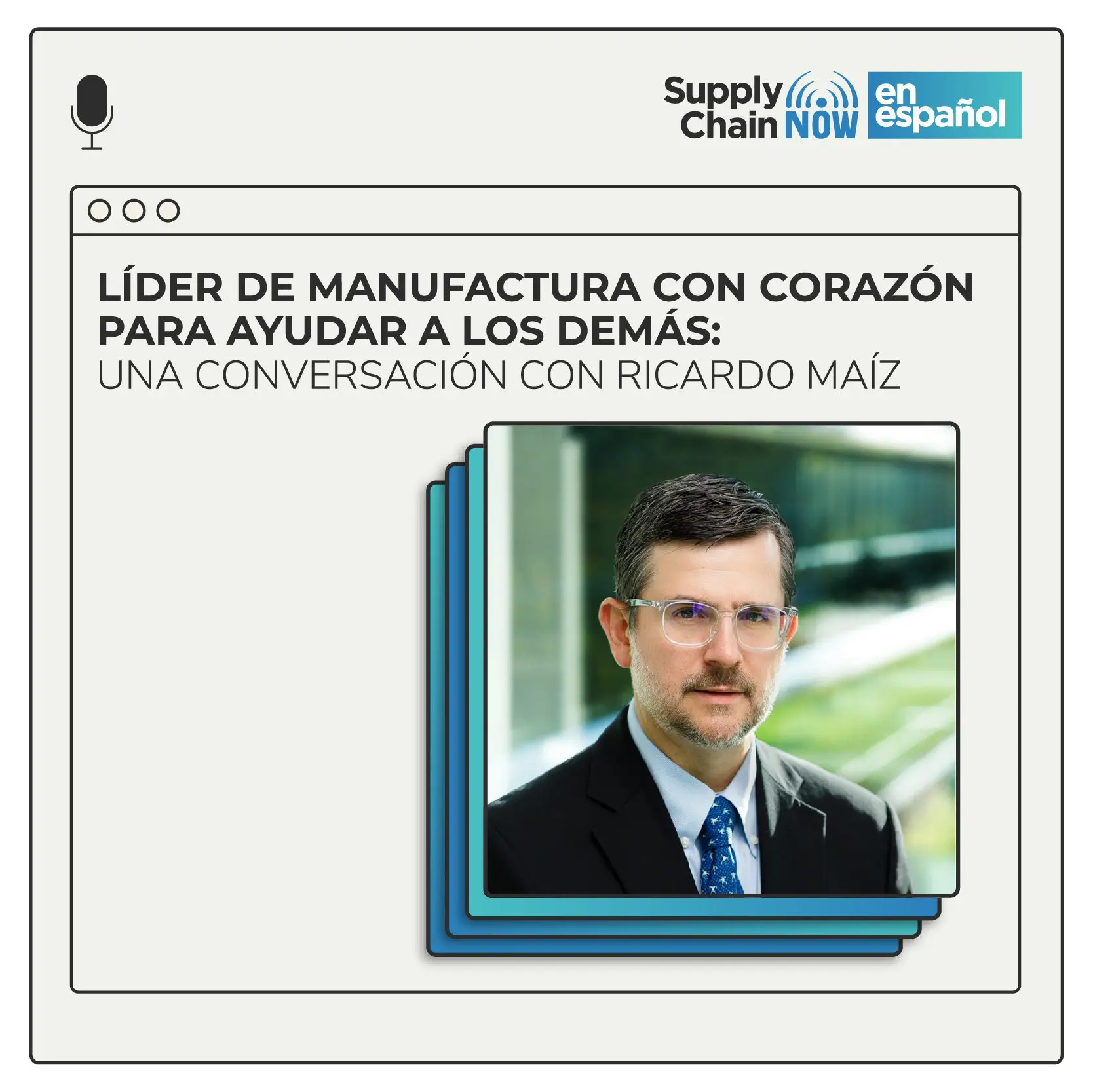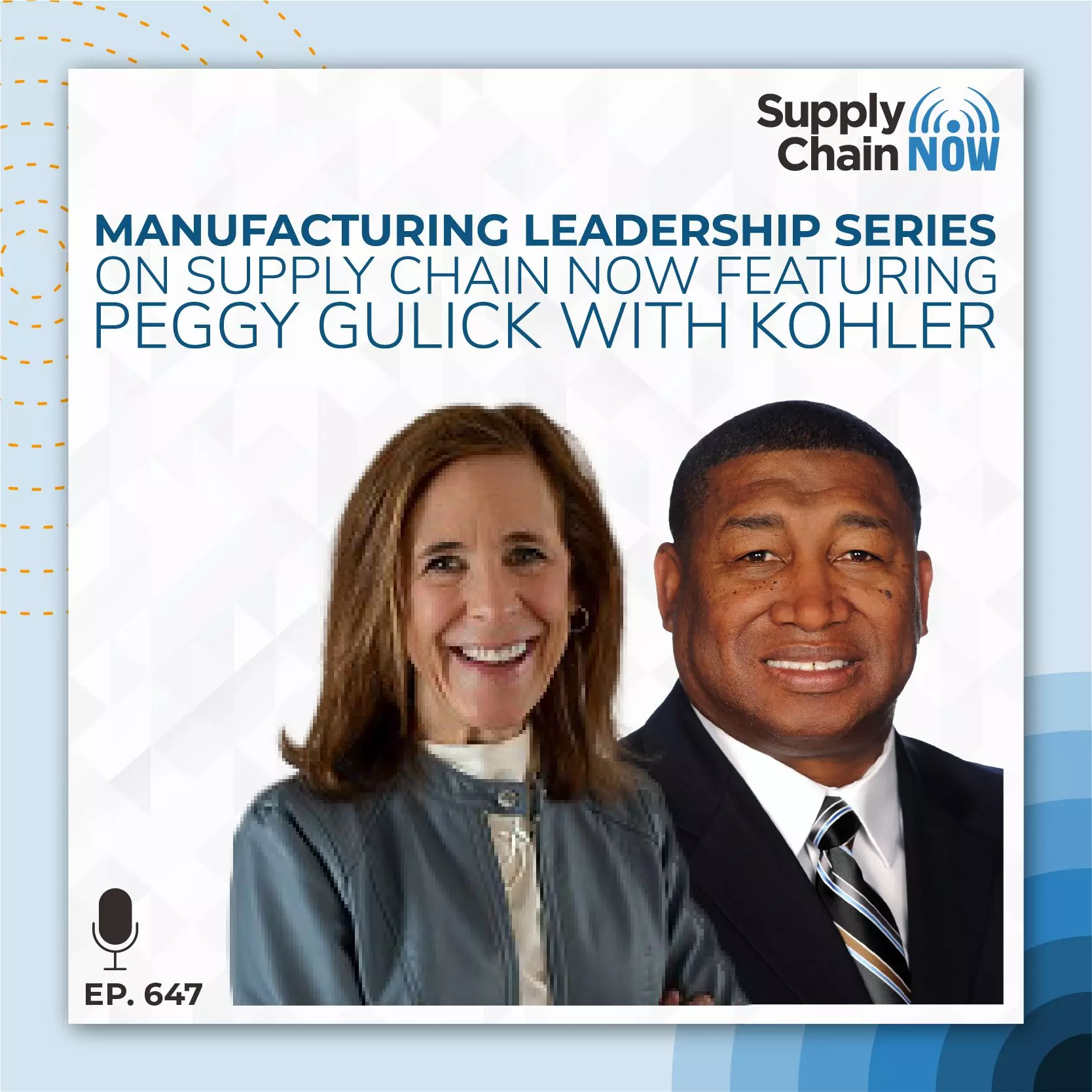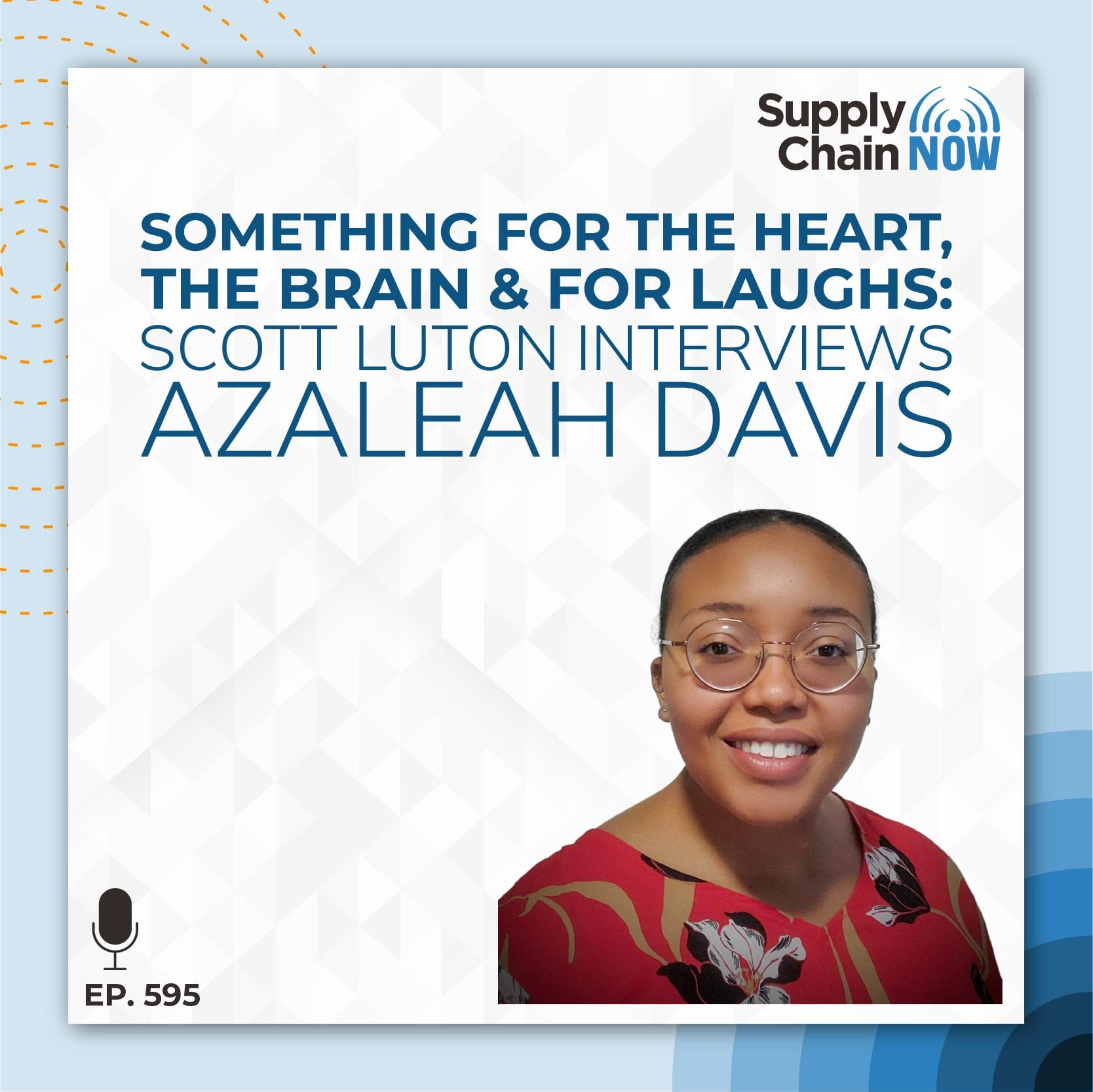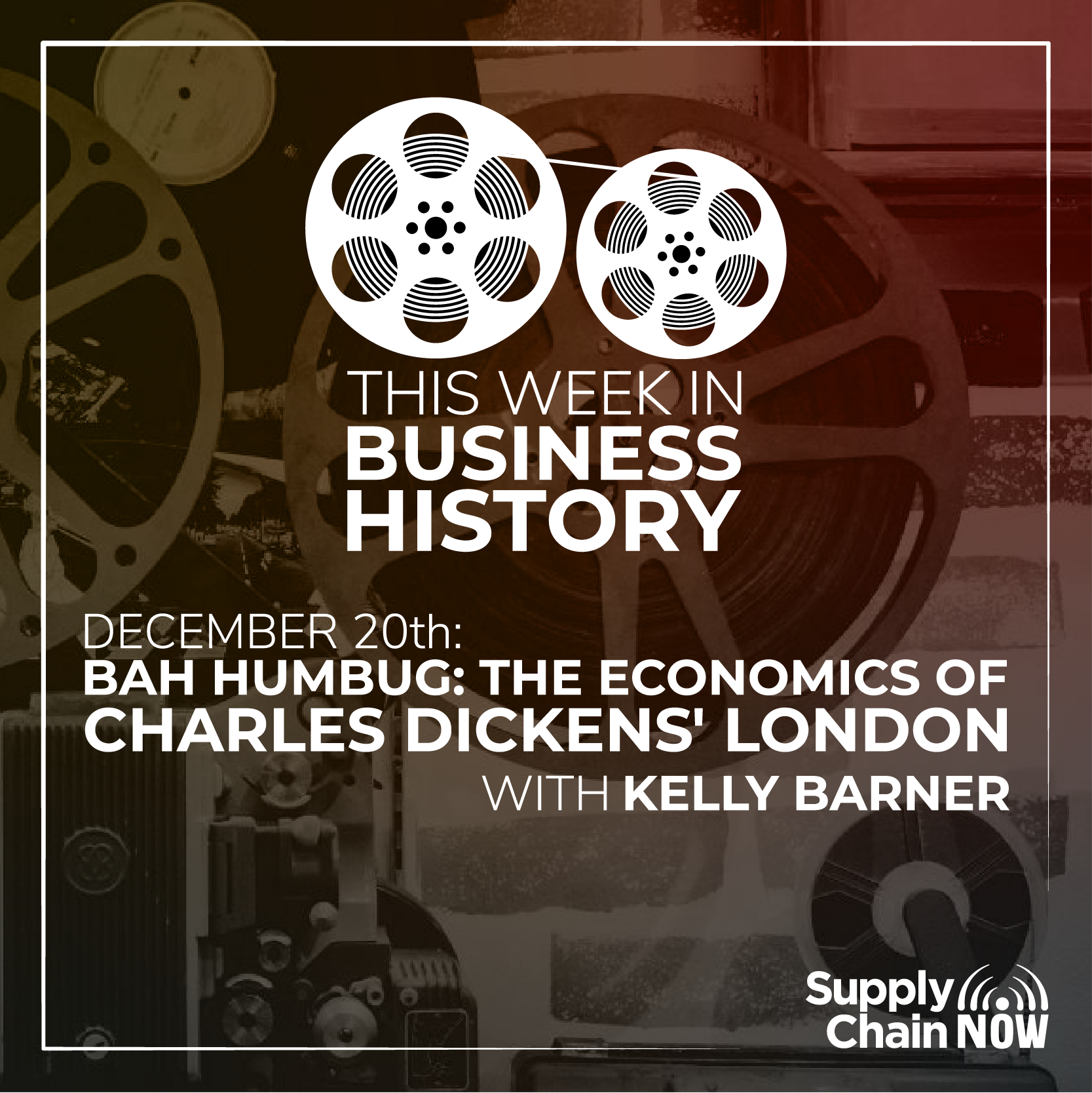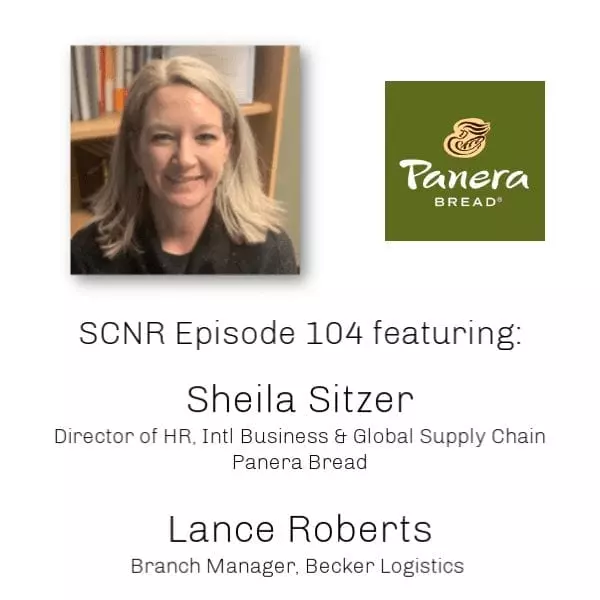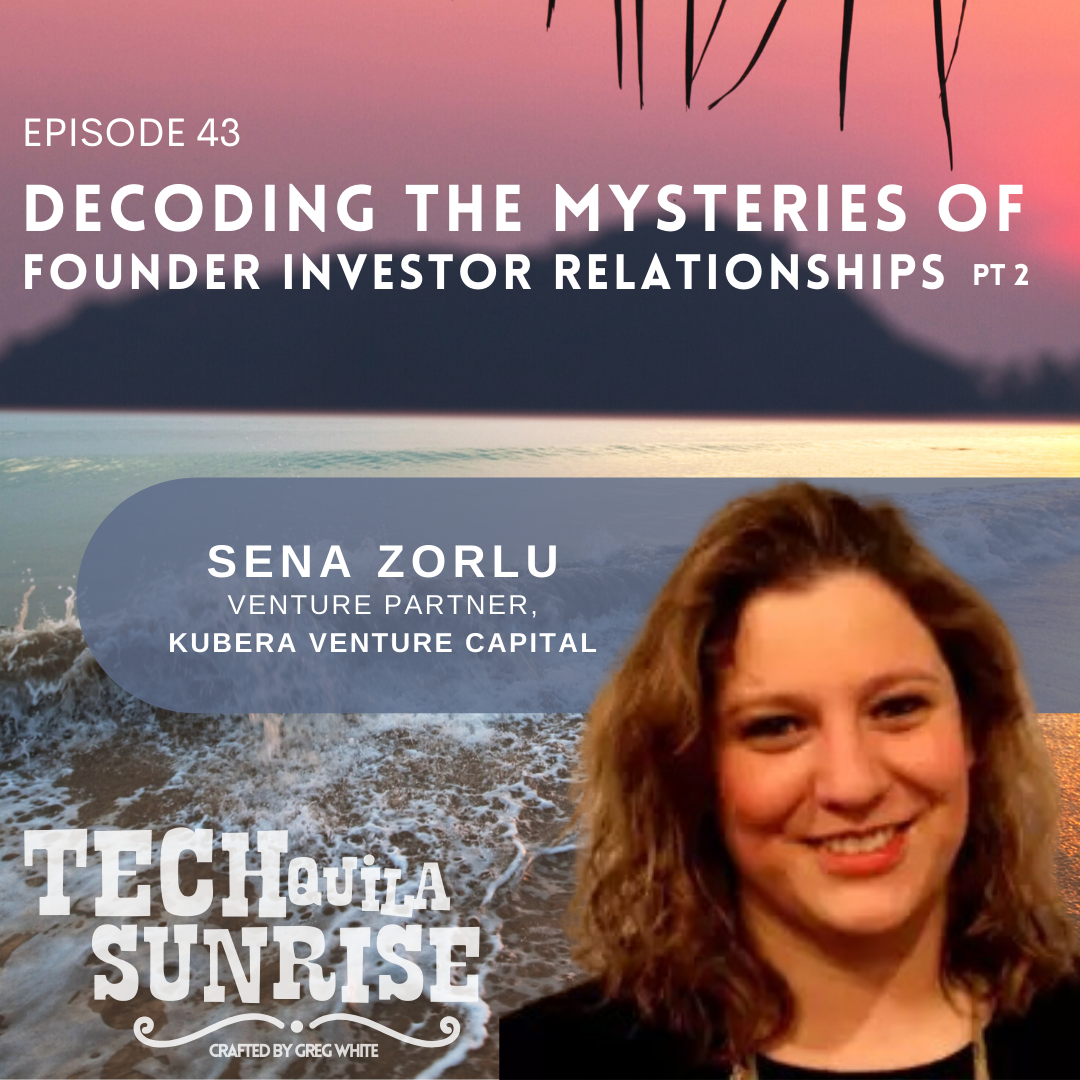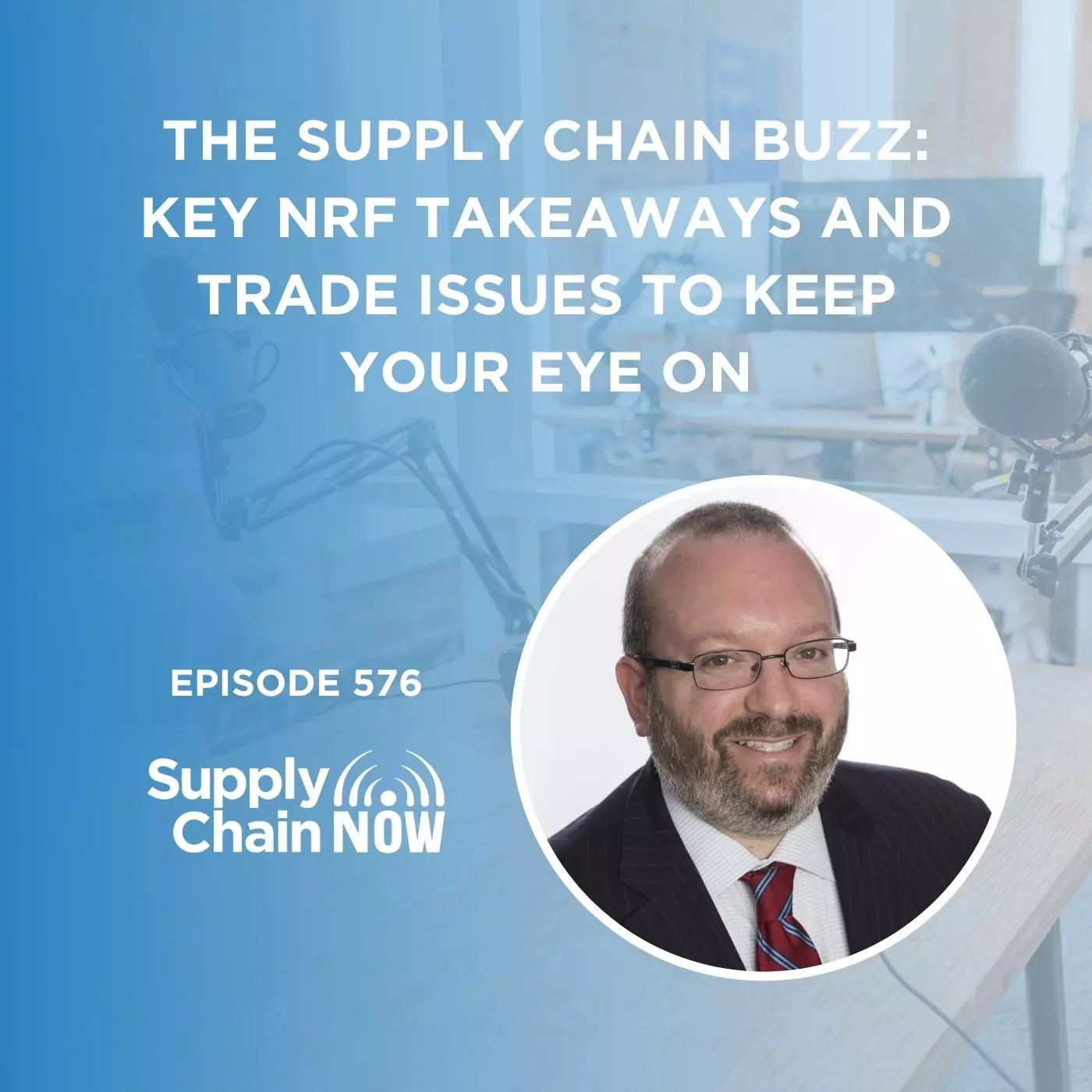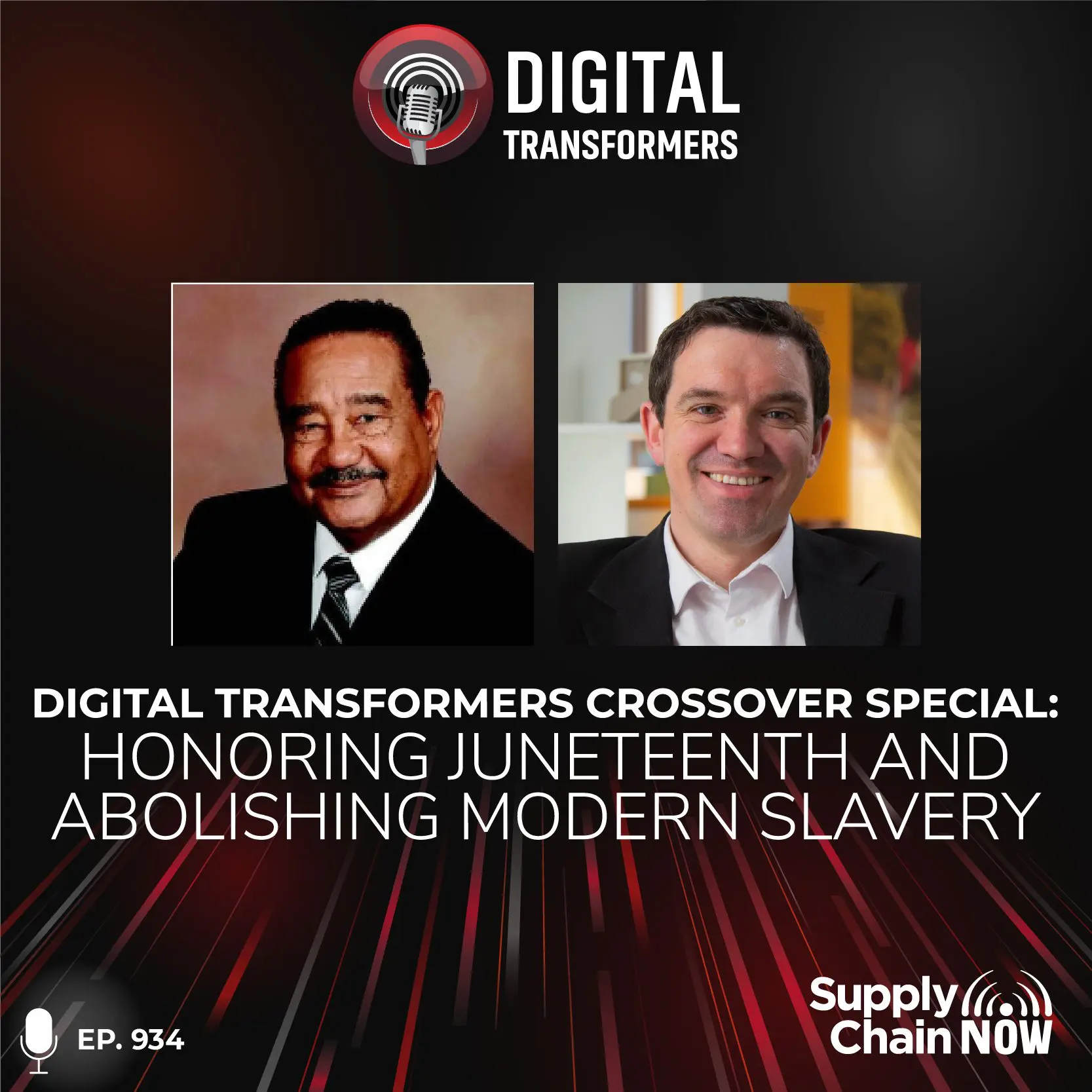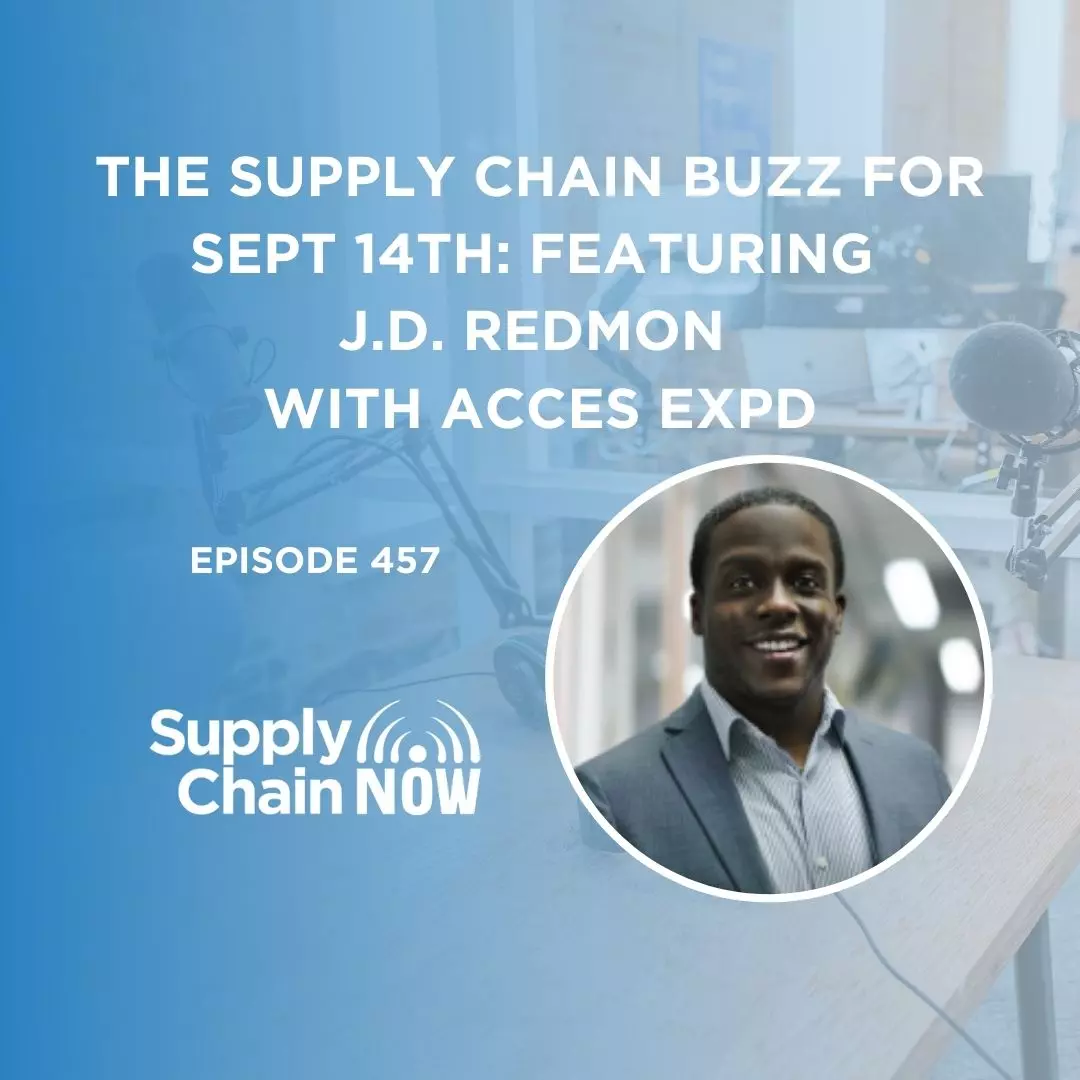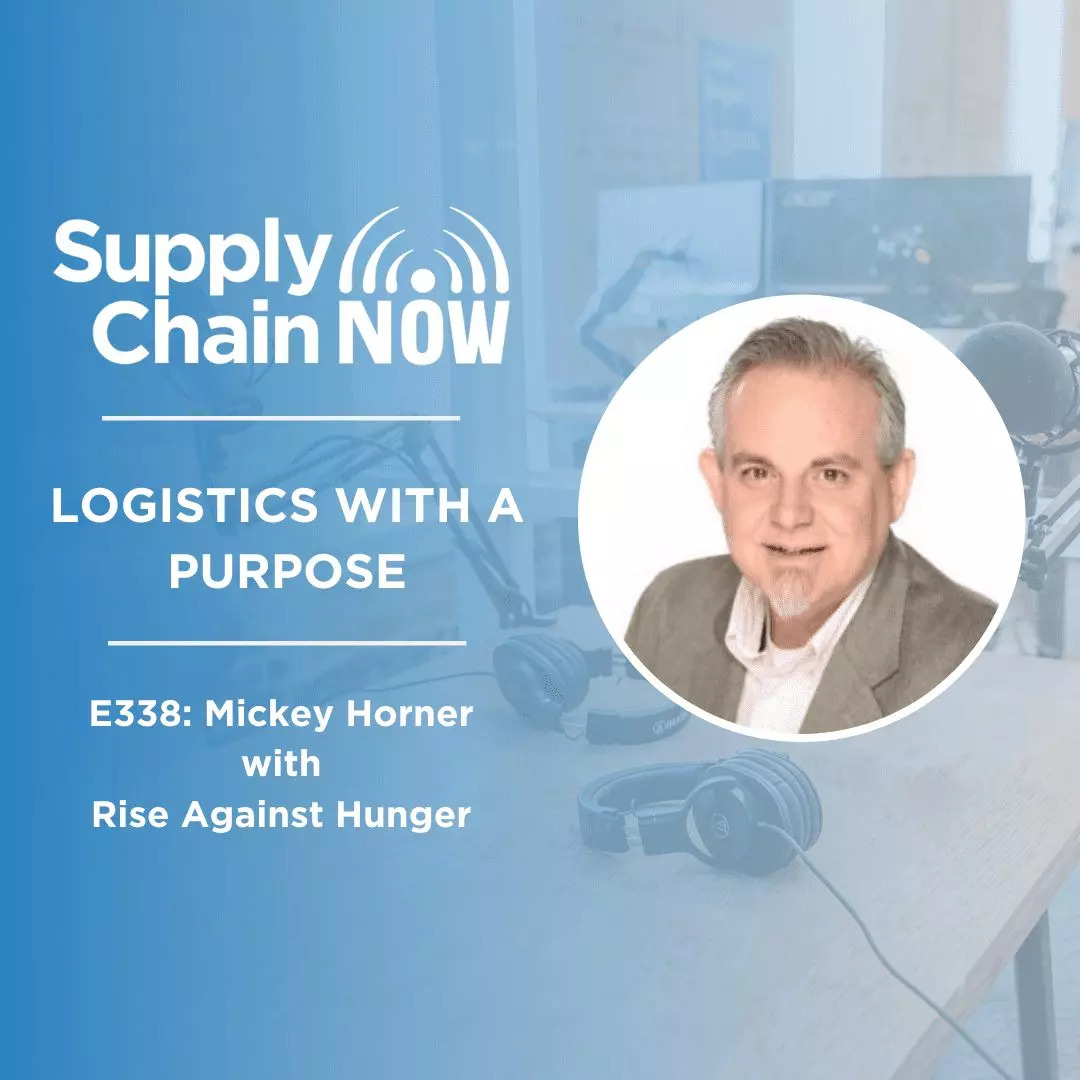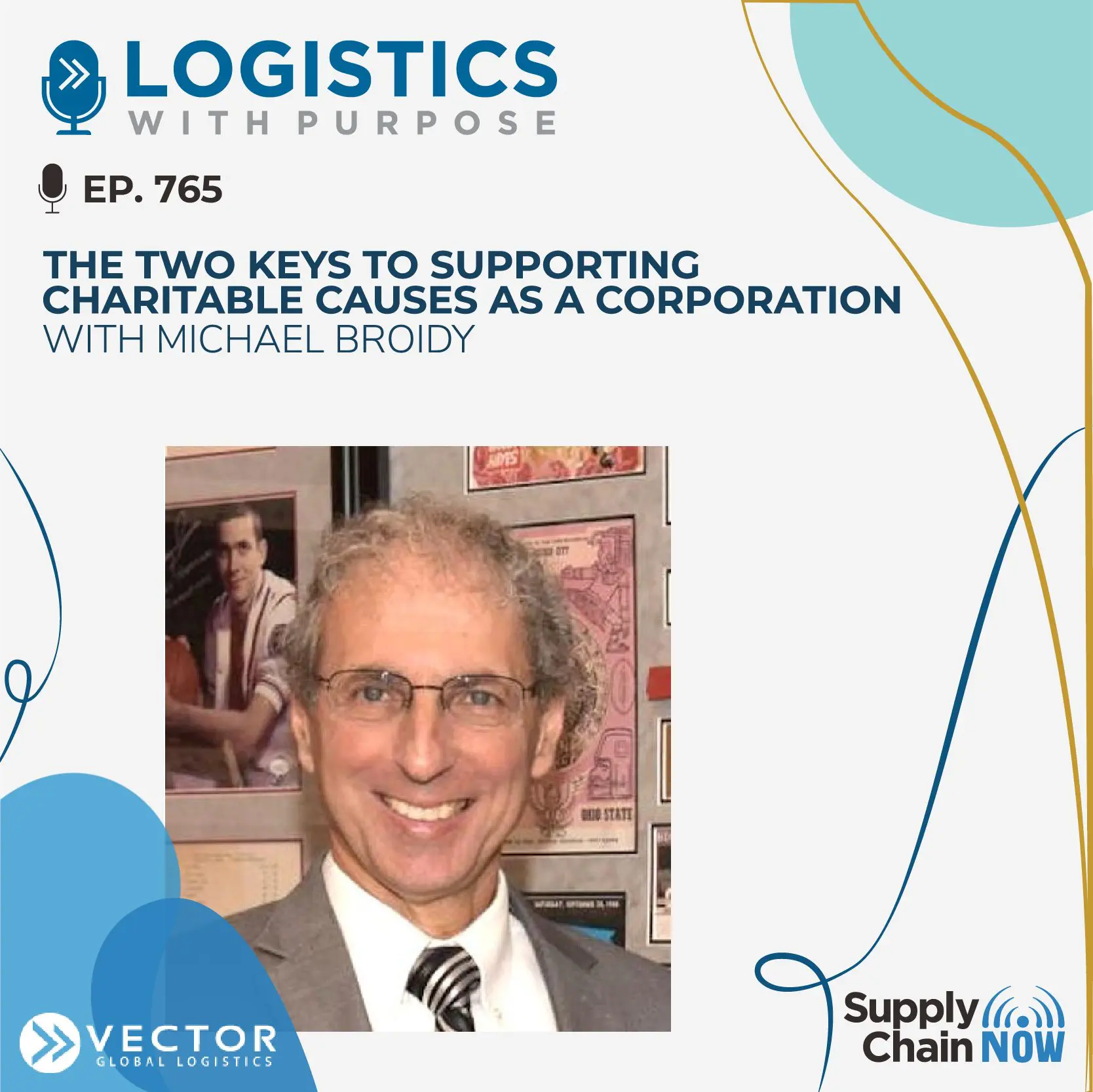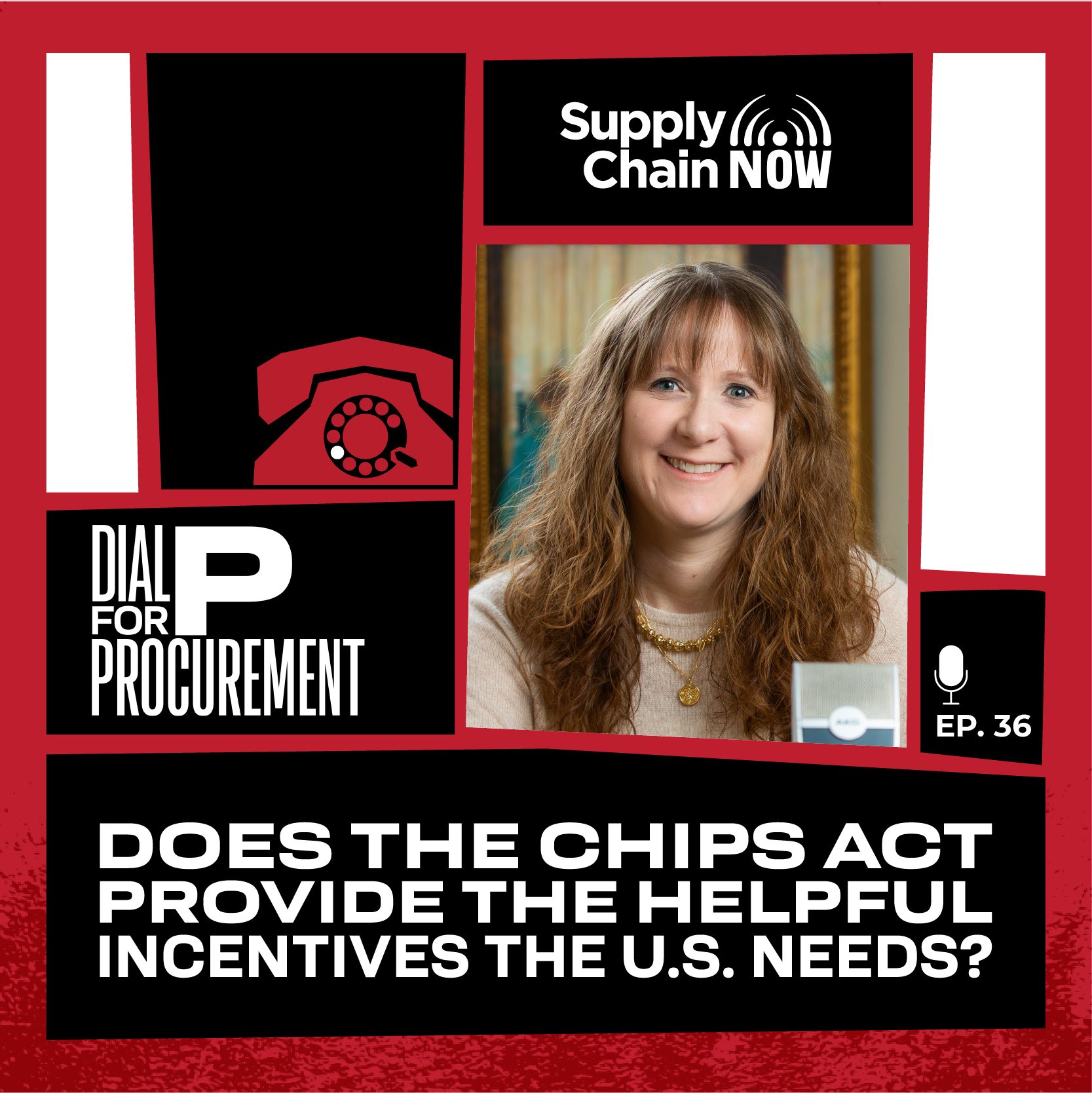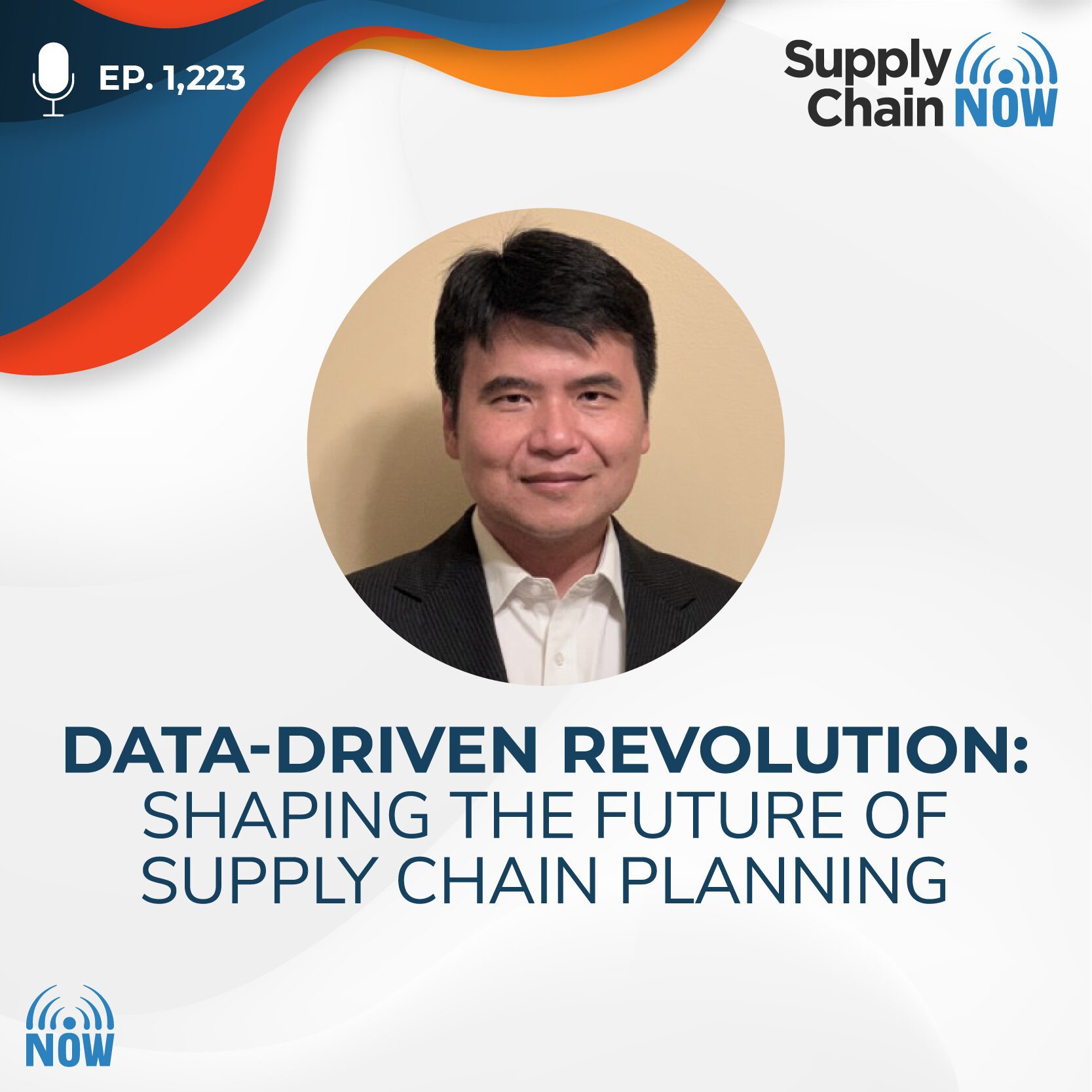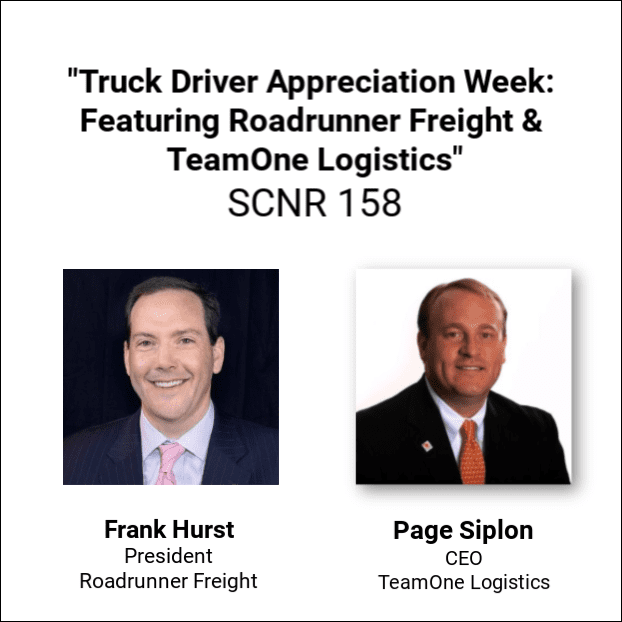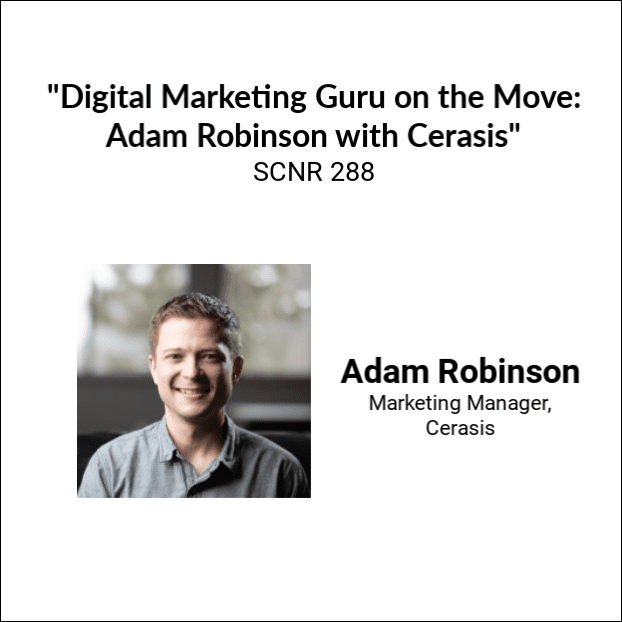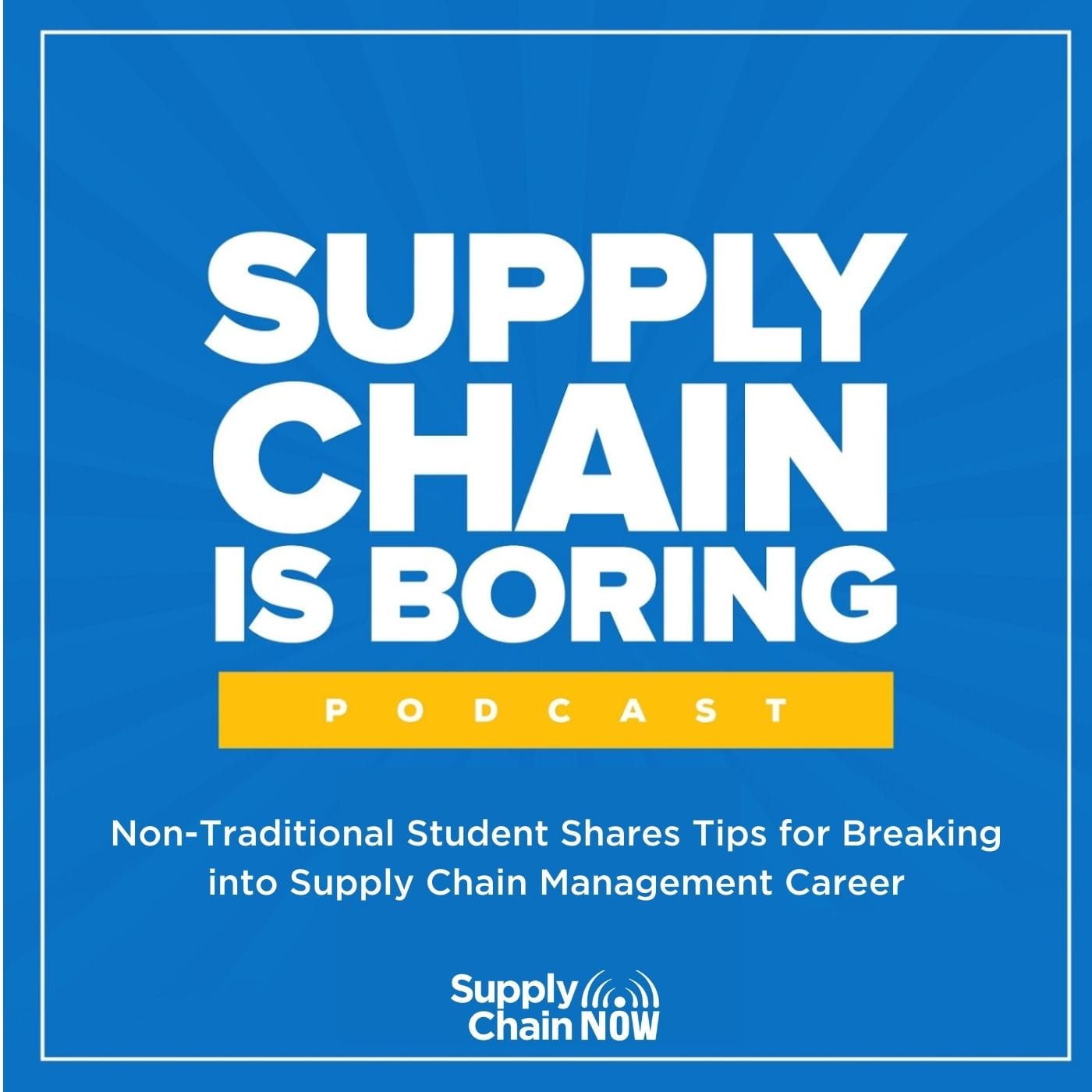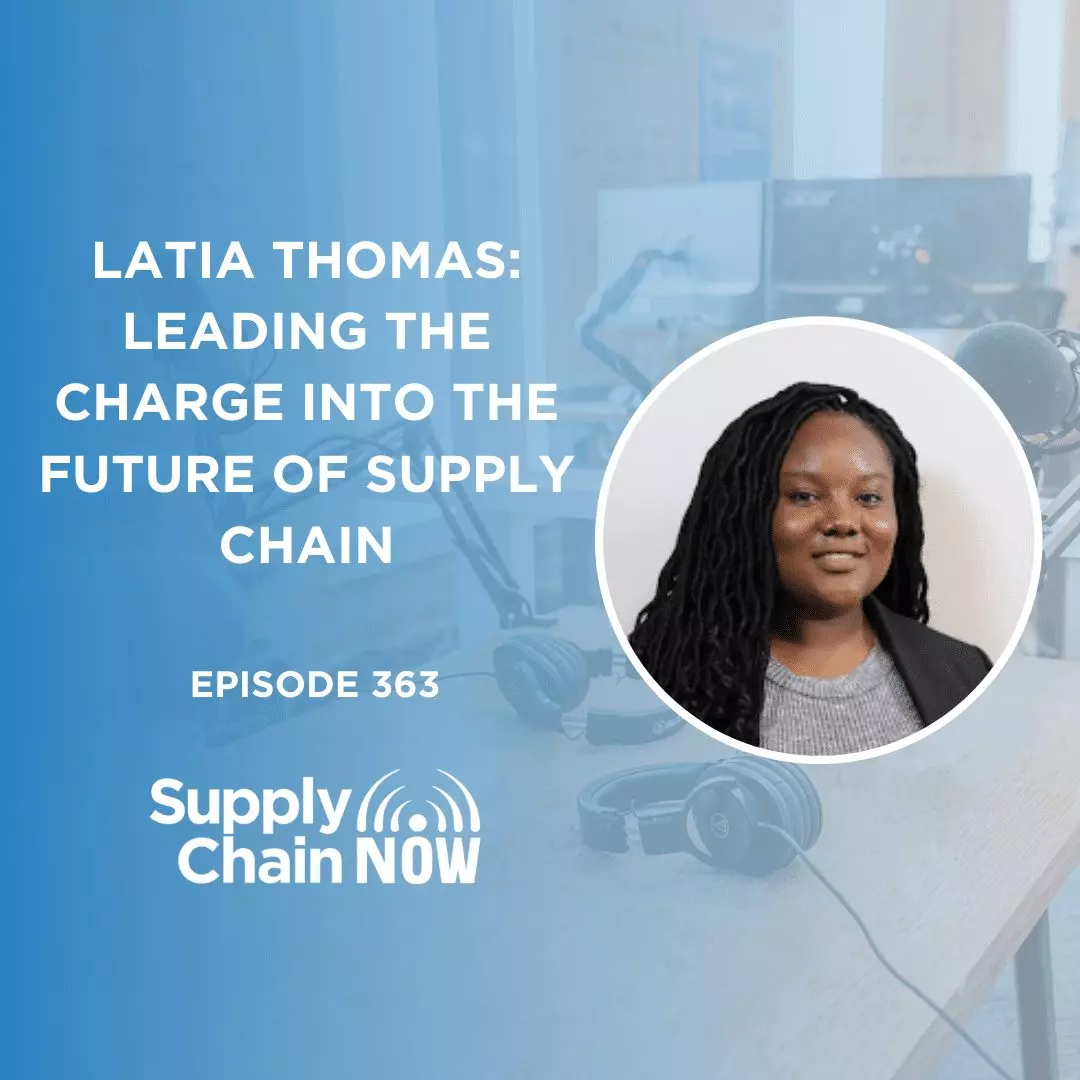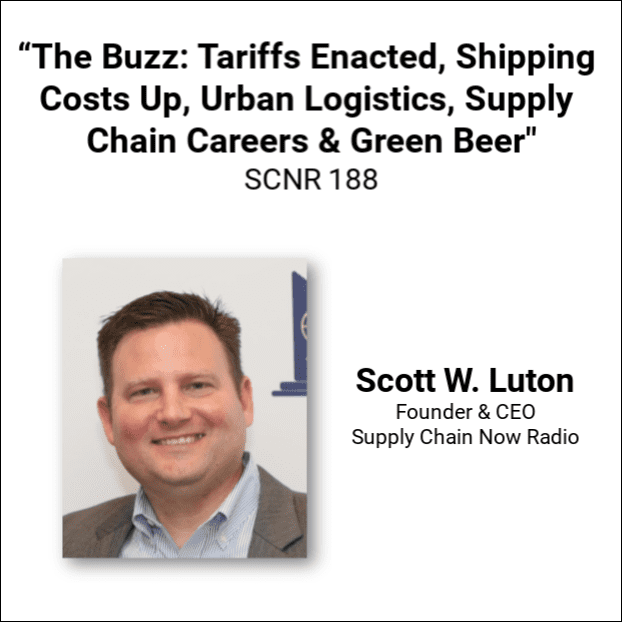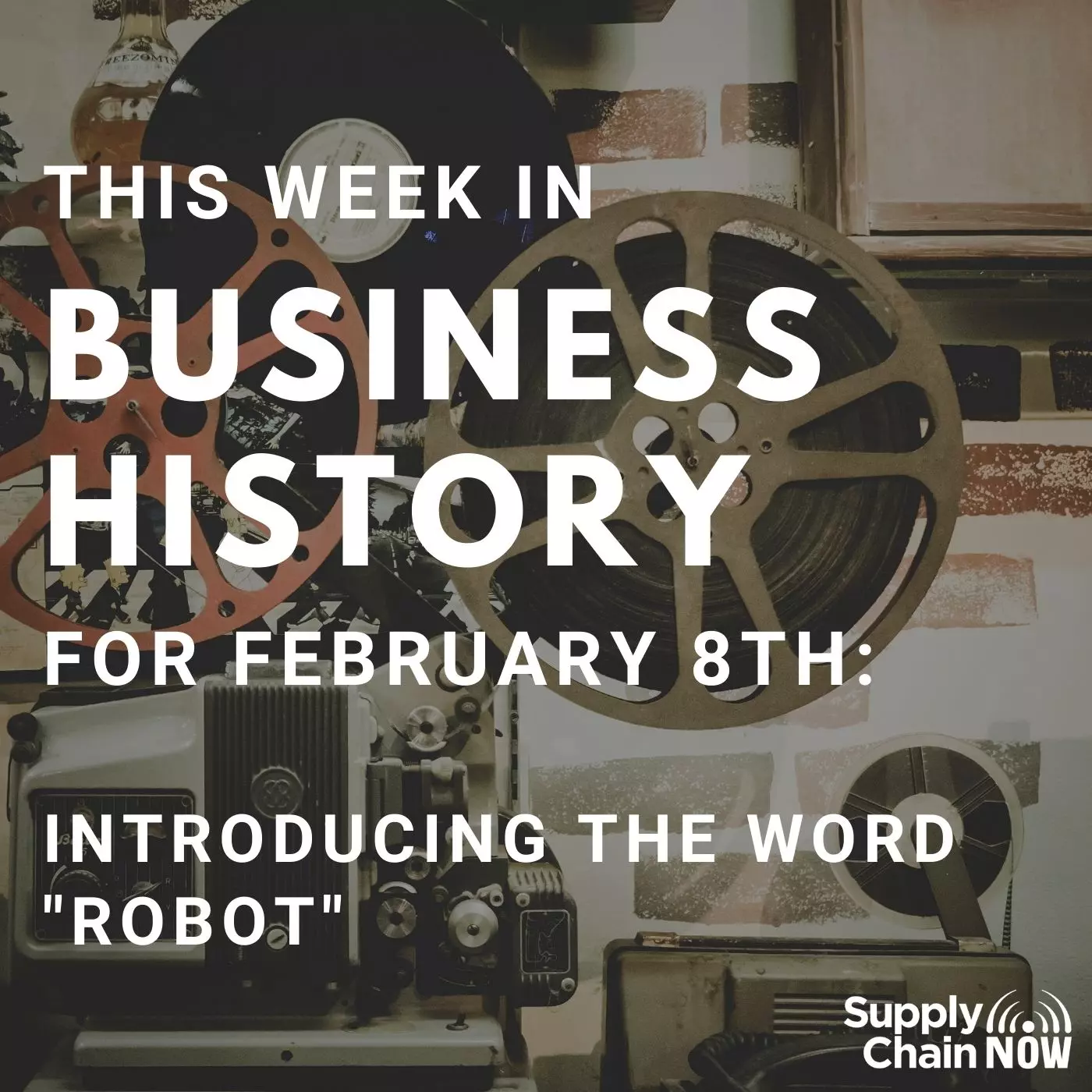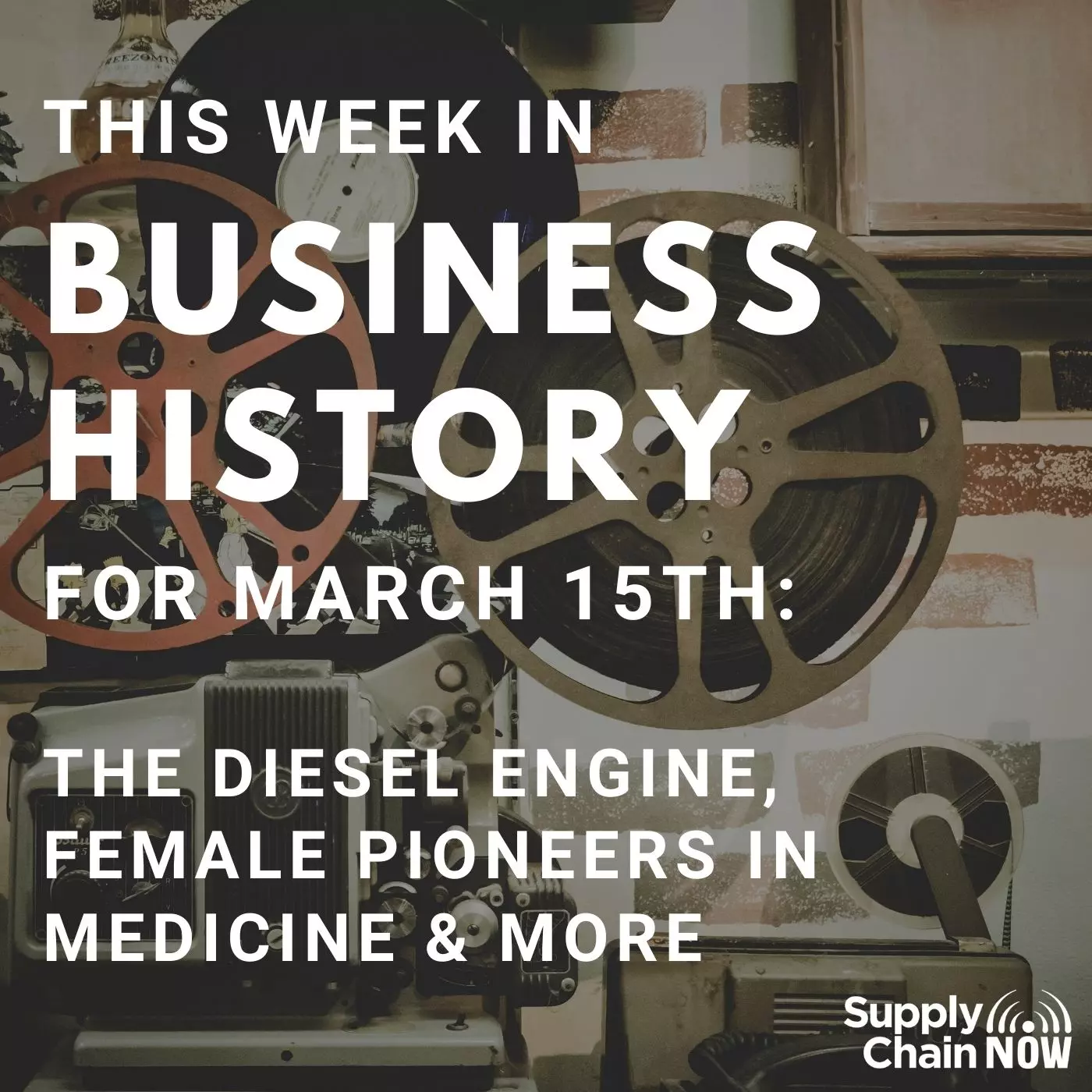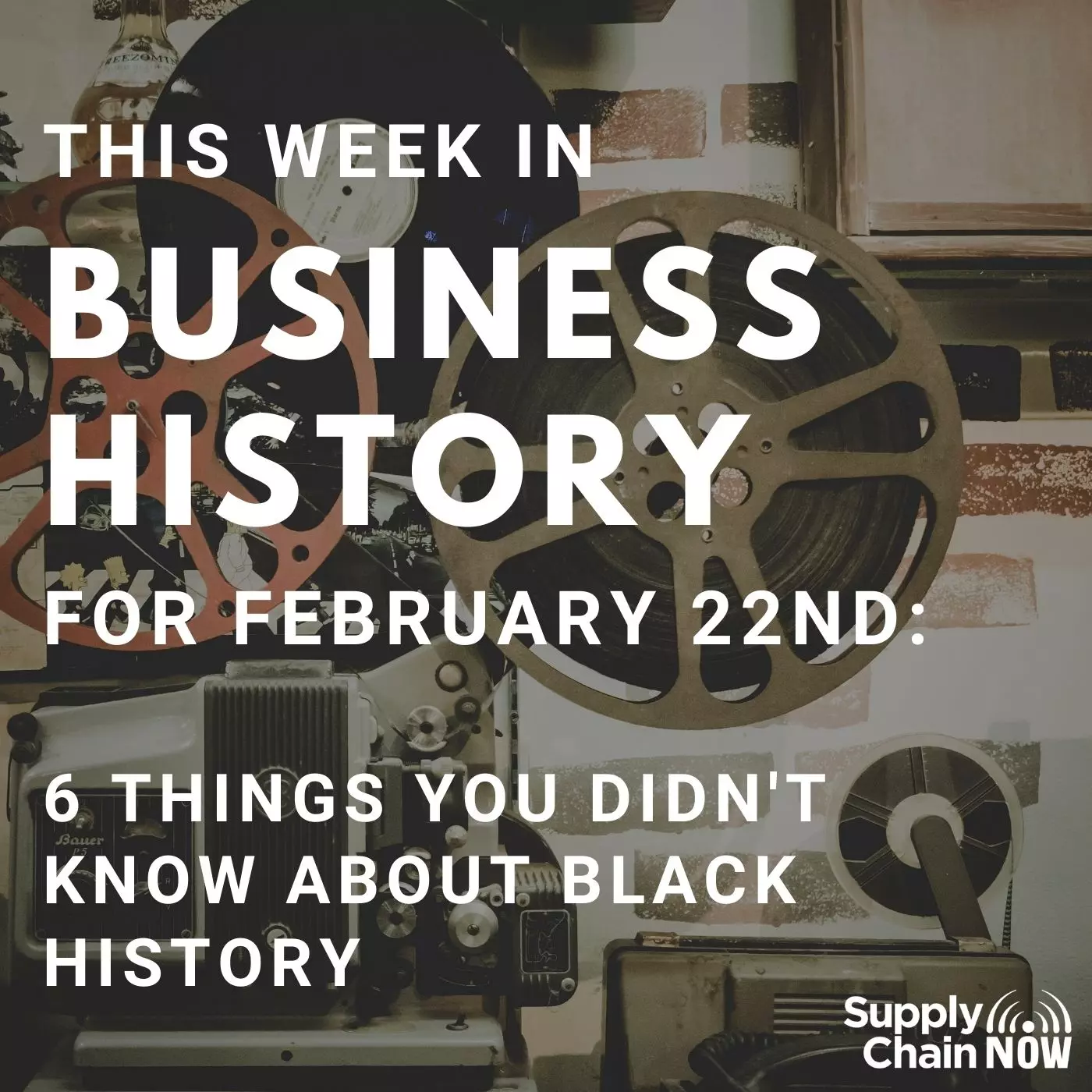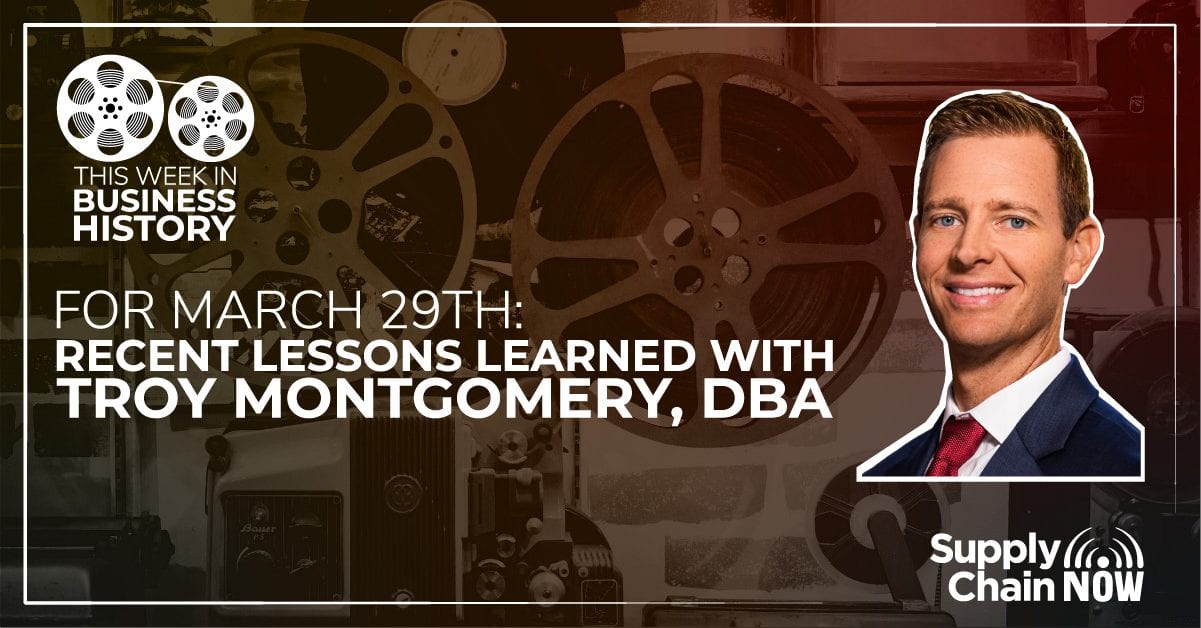
Episode Summary
“Customers are still going to demand to get their product as soon as possible. And customers aren’t going to want to pay price increases for the additional costs that we incur as an organization within our supply chain. So that just means that we’re going to have to become even more innovative.”
-Dr. Troy Montgomery
In this special episode of This Week in Business History, host Scott W. Luton welcomes Dr. Troy Montgomery to the show, who brings a ton of perspective as it relates to business lessons learned from recent history. The conversation covers a wide range of topics, including: how Peloton has become an exceptional supply chain case study; the legends of Fred “Doc Holliday” Tolbert, Judy Montgomery & Dan Berry; and how & why Customer Experience is dominating many business conversations today.
Episode Transcript
Scott Luton (00:00):
Hey, good morning, Scott Luton with you here on this week in business history. Welcome to today’s show. We’re departing from the script again on this episode, you know, traditionally I pick several stories from a business history, especially ones that offer important lessons that we can learn right from the annals of business history. But today we are featuring a great mind and a great friend and someone else’s point of view for a change as we look to, uh, as we take a look back primarily on 2020 and key business lessons learned so quick, uh, quick programming note, not a coffee just yet. Uh, Troy, uh, Hey, if you liked this conversation, be sure to find this week in business history and subscribe for free. So you don’t miss conversations, just like this. Find us across social media. Hey, send your feedback. We’d love to hear from our listeners.
Scott Luton (00:49):
Okay. No further ado. I want to introduce our featured guests here today. After graduating with his bachelor’s in mechanical engineering from Notre Dame, he got his start at general electric iconic business brand. He led a team of over a hundred associates later. Our guests managed a business portfolio valued over $200 million who can relate to that while earning his MBA from the university of Georgia, his doctorate in business administration from the university of South Florida. Our guest has spent 15 to 20 years. I’m going to say in banking, healthcare, and consulting when not teaching and giving back to the current incredibly sharp future business leaders, uh, global business leaders that are matriculating through the university of Georgia he’s coaching and consulting with organizations looking to drive successful change. So join me in welcoming Dr. Troy Montgomery faculty member with the Terry college of business that UGA and managing partner of S C N E partners. Troy, how you doing, sir?
Troy Montgomery (01:46):
I’m doing great. Thanks for having me on the show. Scott,
Scott Luton (01:49):
You bet, you know, it took me several hours, all that you’ve done and try to capture some bullet points there. So I really appreciate you bringing your wealth of knowledge and experience to the show here today. And as I mentioned on the front end, it’s really neat. And I think we’ve done probably about 45 or so episodes here this week in business history, and we’ve had several guest hosts and a guest or two, and I always find it fascinating to kind of bring what they have learned from recent or far past history and, you know, kind of bringing those key takeaways to, you know, where we are today. So I’m, I’m really excited to have you here to share similar key takeaway.
Troy Montgomery (02:25):
Yeah. And Scott, there’s plenty of talk about when you think about just the last year alone and there’s plenty of learnings that I think we’re going to take away and things that are just going to change from here on out. So plenty to talk about when we talk about history, just being a year ago as well,
Scott Luton (02:40):
I’m with you, I’m with you. So, and that really, you know, on that note, before we dive into some of your key thoughts, that’s been one of the great silver linings about this age we’re living in, you know, uh, whether it is, uh, the recognition of all these incredible frontline folks, healthcare, retail, supply chain, you name it that have really move the whole world forward, or all these lessons learn that whether you’re business schools or CEOs or whatever you’re going to be studying this age. I mean, it’s already changed so many aspects of business that, you know, some are short-term changes, some are permanent changes. So we’re going to be studying this, this timeframe. It’s going to offer a lot of learnings to leaders around the world. So on that note, Troy, I really enjoy seeing you in action, especially on the education side. So, you know, educate us and our listenership, you know, what are some of the key things that stick out from the year that was 2020?
Troy Montgomery (03:37):
Well, a few things right off the top. And I think that most of us are aware of when we think about supply chain and that is the trend shifting to a significant reduction in lead time. And so we saw that before the pandemic, right? And there’s plenty of survey information out there. But one that I thought was pretty interesting came from the 2018 survey that said about roughly 10 respondents said that speed was the most important thing when it came to shipping and logistics. And then in 2019, and this is before the pandemic, right. It was up to closer to 20%. So that’s a significant shift in change. And then we’re seeing that even more in 2020 companies like Peloton. So you talk about the learnings that we have in my undergraduate and graduate supply chain management courses. We look at the book, we look at the texts, we look at the theories, but then we look at what’s actually going on right now because we don’t have all the answers.
Troy Montgomery (04:34):
And one of the many cases that we just recently looked at was a Peloton. And I think we’re all familiar with the, uh, the fitness company and they’ve got the nice bikes and treads that, uh, well, yeah, yeah. Well, my, uh, my in-laws, uh, recently purchased one. They ordered it back in November and it was just delivered in February. So they’re having a huge issue with their supply chain and really manufacturing base being over in Asia and getting the product, uh, over here with everything that’s gummed up and shipping and the issues that they’re seeing. But again, flexibility being one of the most important things to companies and individuals right now, cost is still the primary focus when we talk about shipping and logistics, but speed is becoming more and more important. So when we look at Peloton, they’re spending roughly 10 times more per bike to get it over here than they did a few months ago because they’re shipping via air carrier. So that’s just one example where we’re seeing, you know, a huge shift due to the pandemic, but also due to the trend of this, uh, lead time becoming more and more important,
Scott Luton (05:42):
You know, speaking in Peloton and speaking of lessons that we’ll keep teachable moments that will keep giving for years to come there. CEO, I believe it came from the CEO, put out a what’s become a famous communication via email, which he went in, he or she went into all of the different reasons for the challenges and, and, and, and including, you know, they mentioned they’re spinning a hundred million dollars and expert just expediting freight. And they have, uh, as you know, they have acquired a manufacturer here in North, in North Carolina, in the States to help get around some of these shipping issues. So it really is that memo alone is a such a great supply chain case study for, you know, what 2020 is.
Troy Montgomery (06:25):
Yeah. And, and, and your point there with bringing the manufacturing on shore. So they bought a company called pre-core for about $420 million that a us manufacturer of fitness equipment. So North Carolina and then Washington is where they plan to start to build some of these treads and bikes. And, and that’s just one example, right, Scott, I mean, we’re seeing other companies take that same type of strategy where previously they’re off shore they’re in Asia and not just the pandemic, but other pressures related to tariffs and uncertainties when it comes to things like tariffs and how the new administration is going to, to, to treat the global economy. So we’re seeing more of more of that onshore. And, and, and I was also talking with a flooring company, Mohawk, that’s local in Georgia here, and they’re talking about some of the same type strategies where they’ve got, you know, global suppliers, how can we get it here quicker is the answer to move to different suppliers. These are a lot of the questions that have only been exacerbated by the pandemic in 2020. And it’s great to have these cases because students don’t have the answers. I don’t have the answers, but let’s talk through it and let’s utilize some of those skill sets that were learned in supply chain management.
Scott Luton (07:38):
I love it. I love it. Uh, two quick points there. Uh, you mentioned Mohawk and, and flooring, and many folks may not know just how much flooring production takes place in the state of Georgia, including Dalton, Georgia, which by many accounts I believe is still deemed the carpet capital of the world or something like that. So at ton, that’s an important industry here in the state of Georgia. And then one of the things I want to, as you mentioned, reassuring, that is important for the years to come, especially in the information age where we all have our favorite devices, you know, just within our reach, you know, semiconductors, you know, I think that has been off shore for so long. So many of major players have kind of outsource that. Well, now we’re seeing major plants being planned. Of course, it’s not gonna solve anything overnight because these massive, you know, 10 million square feet facilities take a long time to set up and get production running, but we’re seeing more investment here and, and, and, and bringing some of that production here, state side, which may help prevent some things we’re seeing like right now with automotive production lines being slowed down, or, or even stopped due to some of the shortages shortages we’re seeing.
Scott Luton (08:46):
So I love, Hey, we’re starting on a strong note choice. So you’ve set the bar high already. So what else sticks out from 2020?
Troy Montgomery (08:54):
So, so keeping that type of thought process around lead time, it’s kind of a bigger trend than that. It’s companies are focused more on responsiveness and being flexible within their supply chain. So there’s really two parts to this one is being flexible. And then the second part is trying to reduce risk. And in order to reduce risk first, you gotta identify it. So thinking first on the responsiveness and flexibility, I love to have guest speakers come into the class. Scott was gracious enough to come into the class a couple of years ago as well, but recently I had Fred Tolbert. He comes in every, every year and, and works for a demand solutions. So I asked off work hump,
Scott Luton (09:32):
Troy, you know what his nickname is that was coined by, uh, Greg white, right?
Troy Montgomery (09:37):
Probably miss their supply chain. Is it
Scott Luton (09:41):
Close? There was one of those already in our friend, Daniel Stanton, but he is the Fred Tolbert is the doc holiday of supply chain because he tells it like it is so, uh, w we’ve had so much fun. He is such a wonderful person to collaborate with. But, um, so he came in and spoke to your class as well.
Troy Montgomery (09:58):
Yeah. And one of the things he talked about towards the end of our time together, and it came up in a question and answer is about forecasting and how do we forecast with this pandemic what’s going to happen next? And so he talked more about demand sensing, which is looking at a shorter timeframe into the future, as opposed to looking towards next year. We’re looking at smaller chunks and organizations are having to do that right now and react much quicker to the pace of change when it comes to demand another strategy, which we hear often about. So Georgia Pacific is another company that comes in and speaks to my class. And Matthew is a former student UGA, and then not Patel. They came in and they talked about skew rationalization. And I think within supply chain, this isn’t new, but it’s actually happening now. So when, when I was sitting in meetings at GE a number of years ago, we talked about reducing the amount of skews marketing, one at more skews sales, one at more skews, but manufacturing one it less.
Troy Montgomery (10:59):
And we typically didn’t win in those conversations back in those days. But now we’re, we’re seeing that. And it’s, it’s critical to ensure that you’ve got the product in place is that you’re focusing on a smaller amount of skews and a smaller amount of products and for Georgia Pacific. And you think about toilet paper and paper towels in particular, it’s really very similar product and just different packages. So it’s not as hard of a conversation to say, well, let’s limit the amount of different packages we have instead of having all these different 12 roll packs. Let’s, let’s focus on one 12 rolled pack, or just a few of those. So again, all of these conversations that we’re hearing from our leaders in business are coming back to the necessity of having flexibility and responsiveness in their supply chains.
Scott Luton (11:48):
You know, when I think of skew rationalization, that’s been such a big theme in supply, you know, especially in the last 18 months or so. I wish more industries and sectors had a freestyle machine. He was, you know, as someone I’m a big fan of caffeine, free diet, cherry Coke, right? One of those very niche products that, that, you know, probably not, I don’t know, I haven’t met a whole bunch of similar fans, but this freestyle machine that cook rolled out probably 10 years ago offers just about any drink that you want within their inventory. And it really is so efficient that it doesn’t require to your point packaging or, you know, stocking all these different raw materials. It really offers all these different skews in a very efficient and lean way. Uh, now don’t, we all don’t, we wish that so much else. Was it that easy, right? It’s not, but when it comes to skew, rash or rationalization, what we’ve seen global supply chains really limit all these options so they can protect the supply in their core core offerings. That really is, it’s been a fascinating study. And to your point, I’m sure plenty of internal wrangling between sales and operations around which skews and which ones survive and which ones, you know, uh, are shell for low. Well,
Troy Montgomery (13:02):
Yeah, and it, wasn’t, that’s a really good strategy and another strategy, which is right along that same line is called postponement, which is not assembling, not pulling together the final product, just like your drinking example until the last minute. And that enables you to offer a significant amount of variation and skew and customization. And a good example that I often share is with paint. So I love your example. I’m probably going to steal that one and start spearing, uh, in line with, with paint. But if you go to home Depot or Lowe’s, it should white paint. And, uh, and when you find the color that you want, they mix it right there. So they’re not having to hold significant amount of inventory. They’re just having a hold inventory of white paint, but it’s that same approach of waiting till the last minute to give the customer the customization that they, uh, that they desire.
Scott Luton (13:50):
I love that, you know, one of the things that comes across that I spent a while since we sat down and caught up with each other, but I’m Rema instantly reminded as you share your perspective is how lucky your students are, because clearly you’re someone that scours what’s taking place in the real world right now, you know, today and bring that into the classroom, even when it’s problems that are still being worked out, where there is no obvious answers, even the experts have to answer. And then, and then facilitating the discussion with, with students that may have the answers. I mean, that’s the kind of, you know, think of Dan Barry, who I learned from at, at the university of South Carolina, he was a, uh, furniture entrepreneur with, with three stores that, where he made his living did and did well, and that he gave back as an adjunct professor. And he brought all what’s going on. What’s really taking place, you know, right into the classroom. And, and, and let us talk and work it through, even when there were no obvious answers, those are the folks that you want to learn from. And Troy, you strike me as, as someone in the vein of Dan Berry. Well, and
Troy Montgomery (14:52):
I’m glad that you said it. So I appreciate that because one of my goals as an educator is to bring the stories from my war stories, from my experience. And then also just like you said, what’s actually going on. I was educated at the university of South Florida where I pursued my doctorate and Dr. Grant and Gill, Harvard trained brilliant guy, one of the foremost leaders when it comes to writing business cases, and I’ve had the opportunity to train under him and write a business case and a couple of business cases. And one of the things that we talk about when you’re writing a business case. So think about the Harvard business review cases, maybe you had as an undergrad or in a master’s program where there’s a protagonist and they’re faced with some business problem, and they don’t give you the answer at the end, it’s your chance to come up with a solution.
Troy Montgomery (15:38):
And typically there’s no one right answer. There’s multiple right answers, which is the case with business. So the key there is when you’re writing a business case, the best business cases to write up don’t have the answers yet. So we often think that, you know, whoever wrote the business case for Amazon or home Depot or whatever, it may be had the answer before they wrote it up, but that’s not true. The best business cases that you can write up, don’t have the answer yet because you end it with a protagonist having to go to a meeting and make a decision, or having to come up with a report and do some analysis and come up with the right solution. So I say all that, because the best cases to cover in class are the ones that are going on right now, where you have to think through. And there’s not a clear answer of what, what the outcome is going to look like.
Scott Luton (16:24):
Love it. I love that. And of course we haven’t spoken yet about your consulting, uh, work that you do. Uh, we’ll touch on that here towards the end, but one last thought, and then I will make sure we, uh, before we move on to some, a business leader that you admire and have learned from Jeff Bezos famously went in the earliest years of Amazon. And the first couple of years went and presented to, uh, an Ivy league graduate class. And I can’t remember which one it was, it was on one of our earlier episodes. And one of the students after he let them know, as he kind of walked him through the model and this, that, and the other, I said, I’m a paraphrase, you’re a nice guy and all, but this isn’t gonna work. Folks are gonna use Barnes and noble. And it’s just that, it’s that moment.
Scott Luton (17:03):
And look, we’ve all been there. I cringe at some of the things I’ve shared just in the last, probably a couple of weeks, but it’s, it’s those anecdotes make history and business history. So fascinating because to your point, you just never know. And even when you know, you think you’ve got the answer and you think you’ve got it pegged, you know, what’s right around the corner, it’s going to surprise you. So, um, so true. All right. So, so looking back, you know, kind of first part of this interview is looking back at 2020. What else before we move on to, uh, some literate leadership lessons learned, what else sticks out? Troy,
Troy Montgomery (17:35):
The only other one that I’ll share is that even coming out of this pandemic, there’s a lot of things that are going to change, but then there’s, there’s a lot of things that aren’t going to change, and that is customers are still going to demand to get their product as soon as possible. And customers aren’t going to want to pay price increases for the additional costs that we incurred as an organization within our supply chain. So that just means we’re going to have to become even more innovative on how we deliver products, how we produce products, customer service, which gets into a little bit of the consulting side. So through UGA and the executive education program, we’ve helped develop continuous improvement, uh, education through the yellow belt and green belt. So lean six Sigma, but whether it’s lean six Sigma or other continuous improvement, types of tools and techniques, these are going to become more and more important to organizations because of that fact, that customers aren’t going to be willing to pay, you know, a significant amount of increase. Even though we know on the back end, Peloton is a good example. There, we’re having to get those products as quick as possible to cut to customers and we’re having to pay for that
Scott Luton (18:42):
Excellent point. And part of what you were sharing there may makes me immediately think of customer experience, right? That this CX we’ve seen really rise in terms of importance and priority. And, and, and how many times you hear it. It’s one of those phrases kind of lean 25 years ago, maybe, you know, where all of a sudden it became the word everyone was talking about and, and a methodology. Everyone was talking about CX. I mean, we’ve got user experience and employee experience. All those were really important. And, and now more and more supply chain and business leaders are talking about customer experience to your point, focused on what, what they want, but, but also how they get it, what the processes, what experiences obviously, and how we can focus all aspects of business on optimizing that. And so it’s fascinating to see where we are and, and, and what’s that that will lead to,
Troy Montgomery (19:31):
Yeah. And when you say, see where we are, there’s an important, fundamental concept that any consultant engagement or any training that I do includes, and that is looking at the current state. And so while a lot of people might kind of glance over this fact, drawing out of simple or detailed process map is extremely important. And then in CX, we start to call it journey mapping, looking at the customer and all the experiences that they have from start to finish. When we think about our supply chain, it’s more important than ever to identify risks within your supply chain. And that starts with actually mapping it out. And you think about some of these large organizations and how many suppliers that they have, how many products they have and how complex their supply chain is. It’s an, a significant undertaking just to map it out. And then when you map it out, you start to categorize your risk and identify points where we might need some help here, or we might need to hold a little bit more inventory in this particular instance, but I can’t stress that enough, whether it’s in looking at customer experience risks within the supply chain, or just changing an it system, understanding the current state, uh, is an extremely important step before you move into solutioning and changing anything.
Troy Montgomery (20:47):
I’m so glad
Scott Luton (20:48):
You shared that. And it is such an important point. I think you and I both have been in plenty of organizations, especially when you bring in as, as your process mapping, vise rim mapping journey mapping. I think you mentioned as you bring in a cross functional team, it amazes me just how often this office has no idea what this office is doing and why. Right. And, and so immediately you uncover all of these Eureka moments and these learnings that provide for almost instantaneous. I mean, some, some of the things provide for free, simple changes that improve everyone’s experience. So it really is important that current state and understanding that and getting beyond the assumptions that so many people I’ve certainly made it myself, that we make around how things currently work. So that is worth the price of admission, Dr. Troy Montgomery. Okay. So I bet you, and I could talk for several more hours about 2020, and all the business takeaways are so many, we’re just scratching the surface. But for the sake of time, I’m really interested about this net next segment, because I uncovered something in the pre-show that I had didn’t didn’t glean from our earlier conversations. So let’s talk about a business leader in particular that you draw inspiration from.
Troy Montgomery (22:01):
Yeah. And so this was one that most of the listeners product could be familiar with, but, uh, but they probably know somebody that fits this mold. And so that was my mother. She actually was a small business owner throughout my childhood, which allowed so much flexibility. But at the time, you know, I never really appreciated what she had accomplished. So she had a, a consignment shop and had it for probably about 20 years before she ended up selling it right on the onset of eBay. And she recognized that this probably wasn’t gonna be the best business to be in at that time. And what was your mother’s name by the way? Is Judy Montgomery. Montgomery. Okay. Yeah, so he, uh, I grew up in Louisville, Kentucky, and that’s where, uh, that’s where they still are, but my mother was a school teacher, so she was an undergrad and masters in education and taught, uh, in primary school up until I was gosh, probably four or five years old.
Troy Montgomery (22:55):
So it was before I started in school that, um, she started to test out a business idea and that was a used cribs. So in our basement, she would purchase maybe at yard sales or through people that she knew some, uh, used cribs. And she, she thought there was a market for this. So this is still while she was teaching and she would have about four or so cribs in the basement. And we’ll put some ads out in the local newspaper and she’d get a good amount of calls. So that started to, uh, as she continued to test that idea. Cause we talk about this kind of lean startup approach within organizations and innovative approach and fail fast. And I realized, you know, years after living through that, that that’s what she was doing. She was testing the market and identifying that, Hey, yeah, there’s a market for a used cribs.
Troy Montgomery (23:42):
In this example, then she partnered a company right across the river in Indiana about 45 minutes away. That was a manufacturer of cribs. So she partnered with them, was able to drive over and bring and have at least one or two new cribs in the basement as well. So this started to grow and then eventually she leased out some space and that was focused on baby furniture, but she needed something more to fill that space. So she started to include clothing, both baby and children clothing, and she set up a consignment store. And so she realized when she opened the store, that it was really the clothing, not just the furniture that was driving sales and over time that became a very successful business. And a couple of things that I really draw from that is, is, uh, being in supply chain. Now just the significance of setting up the systems in place to bring in new product and then also get rid of inventory.
Troy Montgomery (24:39):
That’s been sitting for awhile. So she came up with a pretty good approach where she would sign a contract with individuals that would bring clothing in. And, uh, after a certain amount of days, a couple months, whatever it may be, she gave the opportunity for them to come pick it up, or then it would go to some different charitable organizations that they partner with. So it became really a pillar of the community as well. So not only was it a successful business, but it was also a huge help to mothers who maybe couldn’t afford, you know, going through the new clothes every few days and they could make some money as they bring back the clothes that, uh, that were gently used into the store. And then for me growing up, you know, I’d see her working in the afternoons and evenings tagging clothes, and then working through the new inventory system.
Troy Montgomery (25:26):
So this is in the, you know, late eighties, early nineties that we’re talking about. And she was on the front of having an inventory management system, uh, in a consignment shop. She had her computer in the store and then a computer at home and would bring those old floppy disks home, uh, to back up the information on the computer at home. So I think, you know, a number of your listeners can probably relate to the systems that were in place and utilizing probably not the most efficient tools, but at the time they were, you know, efficient, but then also just allowing the flexibility to serve the community as well as, you know, still be, uh, still be mom and be at home, uh, with, with me and my sister, as we continued to grow up.
Scott Luton (26:11):
I love that for so many different reasons. Uh, of course, as an entrepreneur, it hits me right in the heart. Right. Cause I can, we can, many of us can relate to that journey, but the intense focus on all the reas that’s so important these days, right? Remanufacturing, recycling, reusing, you know, there’s only probably a handful as you described that time period to eight late eighties and early nineties, clearly there wasn’t enough focus and smart people doing things in that regard during that timeframe, which, which is, is, is sad, but, and that’s kind of part of the reason where we are today, right? It’s for so many, you know, in so many different aspects of, of trying to really reach that circular economy, but here at trailblazer, like your mother, Judy Montgomery, right, right. To build a business model around that while, while also to your point, not only embracing those elements, but helping others and the folks that couldn’t afford the new stuff. I mean, we’re both fathers and that, and this stuff is expensive. It was baby manufacturers and, and clothing manufacturers are very proud of their stuff and they should be. But, uh, what a wonderful story and champion for many things that G Montgomery has been. So, uh, and I’m, I know we’re just scratching the surface probably own on of things and leadership lessons and business lessons you learned from your mother. Yeah,
Troy Montgomery (27:31):
Absolutely. Yeah. And, you know, growing up as seeing the business continuing to grow was, was, uh eye-opening as well. So she never had a significant amount of poise, but was managing, you know, four or five employees. And, uh, and most of those employees were women and mothers as well. So seeing her flexibility and working with her, uh, her team was extremely important and something that I always remember if there was a ball game or, uh, something came up for some of her employees, she was the first one to say, all right, well, I’m going to run into the store and take over the shift. And so it was amazing to, to see that and the relationships that she built, you know, w with her team as well,
Scott Luton (28:13):
Love that, uh, flexibility certainly as been, uh, a greater point of emphasis in 2020, which is neat, but it’s all, you know, the savviest leaders have always appreciated and exhibited and put an emphasis on the value of flexibility has, but for their team members, you know, whether it’s going back to the industrial age, you know, to where we are today and of course moving forward. So I, I love so many different aspects of, uh, of the story you’re sharing about your mother’s business. So we’ll have to have her own down the road.
Troy Montgomery (28:46):
Another thought on that is just that the timing and the knowledge on when to exit the business. And, uh, and she ended up selling the business, like I said, right around the onset of internet companies like eBay and other companies that were doing something similar to larger market. So, um, she had the wherewithal and the business knowledge to say, you know what, this is not, probably not the right time for her to dig into, you know, uh, an online retailer and she wasn’t willing to take the business that way. So it was time for her to exit. And she acknowledged that, recognize that, and thought there might be a better opportunity for another owner to come in and take over
Scott Luton (29:24):
Love that we got to pick our spots these days. Right. Or there are those days, any days you got to pick your spots. All right. So we’ve kind of ventured the first two topics here. We talked about 2020, and some of your key takeaways from business standpoint, that will probably be around for a long time, in terms of lessons learned. We talked about Judy Montgomery and some of the lessons learned there from what a wonderful entrepreneurial story. There’s so much there we’ll have to have her own. Now let’s arrive as we start to wrap, let’s talk about what you’re doing now, let’s do that twofold. I love how you’ve already shared some of what your emo, when it comes to, uh, educating and, and facilitating learning for your students. So, you know, any, any additional thoughts there in terms of what’s next? Um, as we, I guess we’re halfway through the current semester, uh, I’m not even sure how, how classes work these days. So speak to that, if you would. And then also, I want to talk a little bit more about how your consultant organizations and helping them get through some, some tough to manage change.
Troy Montgomery (30:23):
Yeah. So regarding, uh, university of Georgia and Terry college of business, we we’ve got an excellent program in the management department with the supply chain and operations emphasis. So we got about 125 top-notch students that are coming through that program, where they study some of the fundamentals related to supply chain, supply chain, analytics, operations, project management, but more importantly for these students there, they’re also management majors. So they have a really good and a cross-functional view of, of how to run, how to be a leader, you know, within a business. So, yeah, we’re about halfway through the semester and this semester has been odd as well as the last semester with a lot of online education. But again, I think this is going to be a shift within our higher education in providing more flexibility. I know for me personally, it’s, it’s pushed me to have more variety in lectures, more variety in guest speakers coming in variety of how the message is delivered, whether it’s video or in person or online.
Troy Montgomery (31:27):
Um, so it’s, I think it’s pushed me and probably most educators to think outside of the box. And when we come out of this pandemic, on the other side, we’re going to have a lot more tools and techniques to try to keep our students engaged. Um, so yeah, excellent. Uh, also within the university of Georgia, we’ve got a really strong executive education program where I partner with, um, this is also my business partner and my consulting firm, S C and E Dr. Don Addison. So we partnered together in delivering a lot of the same concepts to our students, both undergraduate and graduate, but more to the executive leaders, mid-level managers and individuals that are out there fighting the good fight right now, Don like myself has a number of years of practical experience. He was a senior level executive at bank of America for about 20 or 30 years.
Troy Montgomery (32:20):
And then he retired and came on within the Institute of leadership advancement at UGA. So both Don and I provide an, an academic view, but also a practical view having a significant amount of experience. So through the, uh, university of Georgia executive education program, we’ve partnered to pull together a number of different opportunities, including leading change, which there’s no shortage of change out there, project management, and then some of the continuous improvement lean six Sigma skill sets that we previously mentioned. So we’re staying pretty busy when it comes to educating the undergraduate graduate students, and then also continuing to partner and work with organizations through executive education at UGA.
Scott Luton (33:05):
Love it. And there’s so much more there, but, uh, from a timing standpoint, we will start to wrap now. I really like how you, you share. And, and again, I hate to keep going back to the classroom, but between the communicating and where you put your, your, your focus and your points of emphasis in your overall emo, I bet. And just like, I’ll talk about Dan Barry some, well, I’m not gonna, um, 30 years ago, I guess. I bet I bet students are gonna be talking about Dr. Troy Montgomery in, in a very similar fashion that, and business leaders, uh, find your consulting journey to be fascinating as well. So a pleasure to sit down with you once again, it’s been too long. Let’s do it again. Uh, maybe one of these next go rounds, we’ll include some of the, the incredibly bright folks. You, you have the chance to, um, to, to educate, but also probably learn from yourself, right? Yeah,
Troy Montgomery (33:53):
Absolutely. Scott, I appreciate you having me on and, uh, look forward to connecting with anybody out there via LinkedIn or, or visit our, our website, WW dot S C N E partners.com. Uh, be happy to connect with individuals out there.
Scott Luton (34:09):
Wonderful. And we’ll make sure that makes it into the show notes. We’re after one click here, as we try to our listener experience LX, uh, we try to make sure it’s as easy as possible for folks connect with our guests and these, and these remarkable journeys that our own. So Dr. Troy Montgomery, a pleasure. Thanks so much for joining us. Uh, again, a faculty member with the Terry college of business at UGA and managing partner of S C N E partners. Thanks so much Ms. Scott, you bet. So folks, if hopefully you’ve enjoyed this conversation as much as I have, it was kind of wide ranging, but there’s so much to talk about. There’s so many, it’s a fascinating time to be not just in global supply chain, but global business. And as, as Tori mentioned, leading through change, there’s no shortage of it out there.
Scott Luton (34:52):
So if you enjoyed this as much as I have be sure to check out this week in business history, subscribe, wherever you get your podcasts from, we offer a money back guarantee. If you don’t like the conversation, Hey, we’ll give you your money back, but on a serious note, thanks so much for joining us here today. Thanks so much for listening to our podcast series. Hey, on behalf of our entire team here at this week in business history and supply chain. Now Scott Luton signing off for now. Hey, do good. Give forward. Be the changes need to be just like Judy Montgomery. And on that note, we’ll see next time here on this week in business history. Thanks everybody.
Featured Guests

Dr. Troy Montgomery is a performance improvement professional focused on solving problems, improving operations, and working with executive leaders to implement solutions for change. In addition to being a Managing Partner at SC&E, he is also a full time faculty member in the University of Georgia Terry College of Business where he teaches undergraduate and MBA Operations Management, Supply Chain Management, Lean Six Sigma, and Project Management. He has more than 15 years of experience working with large organizations across multiple industries including consumer goods, retail, financial services, healthcare, industrial supplies, and utilities.
Prior to becoming a faculty member, Troy served as a Strategy Engagement Leader at the health and wellness company Humana. Troy started his career as an engineer at General Electric where he successfully led manufacturing projects and later large teams in the field of operations. He moved into a career in consulting where he helped solve complex business problems and advised executives in Fortune 500 companies that included Bank of America. Troy is also an experienced researcher, adjunct professor, and dissertation chair to doctoral candidates at the University of South Florida.
He received his BS in Mechanical Engineering with honors from the University of Notre Dame, graduated top of his MBA class at the University of Georgia, and earned his Doctorate degree in Business Administration (DBA) from the University of South Florida. Troy is a certified Lean Six Sigma Black Belt and a Project Management Professional (PMP).
Outside of teaching and advising organizations, he enjoys spending time with his wife, son, and daughter. Connect with Dr. Montgomery on LinkedIn.
